Program-Wide Team Members

Dr. Mariyn Torley, Principle of Clifton Early Learning Academy, explains how the Pyramid Model practices and using data-based decision-making helps to make effective change within her school.

Dr. Mariyn Torley, Principle of Clifton Early Learning Academy, explains how the Pyramid Model practices and using data-based decision-making helps to make effective change within her school.
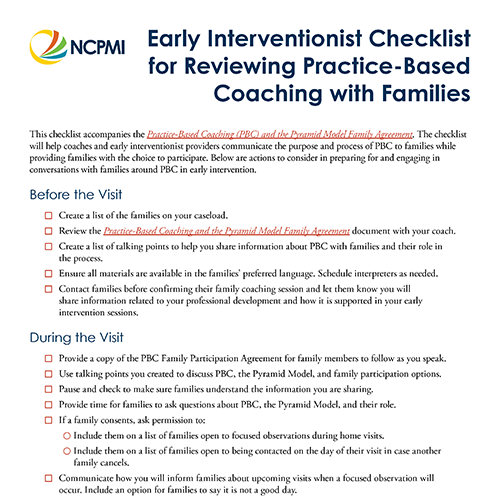
This checklist accompanies the Practice-Based Coaching and the Pyramid Model Family Agreement. The checklist will help coaches and early intervention providers create a plan to communicate the purpose and the process of Practice-Based Coaching (PBC) to families while providing families the choice to participate. Below are actions to consider in preparing for and engaging in conversation with families around PBC in early intervention.
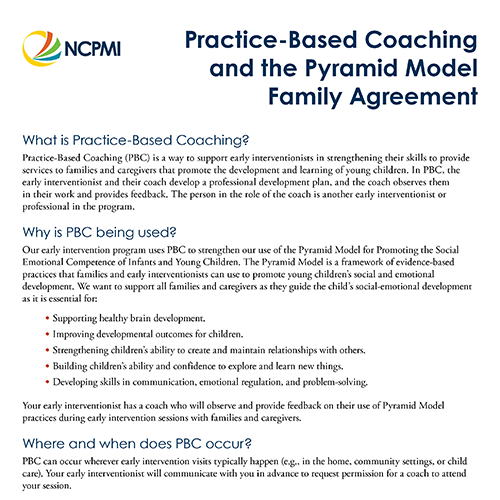
This handout can be used to guide early intervention providers to communicate the purpose and process of Practice-Based Coaching (PBC) to families while providing families with the choice to participate. Families can be provided a copy of the handout during a scheduled visit, and early intervention providers should engage in a discussion with families around the talking points outlined in the document. The Early Interventionist Checklist for Reviewing Practice-Based Coaching with Families can be used with this handout to help early interventionists and their practitioner coaches to prepare for discussions with families around PBC.
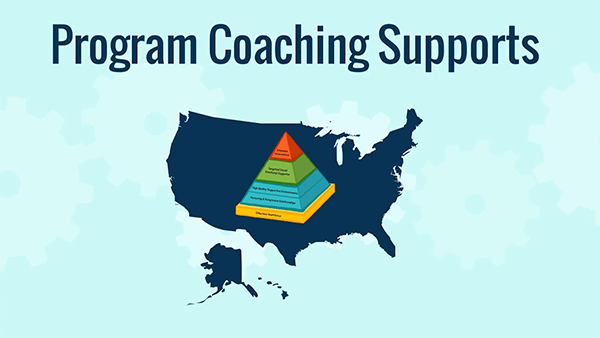
Overview of what a Pyramid Model Program Coach is, their requirements and responsibilities.

Overview of what a Pyramid Model Program Coach is, their requirements and responsibilities.

This tip sheet provides guidance for program leadership teams on establishing unique identification codes (IDs) instead of using names and other identifying information for data collected about children, early interventionists, and teachers.
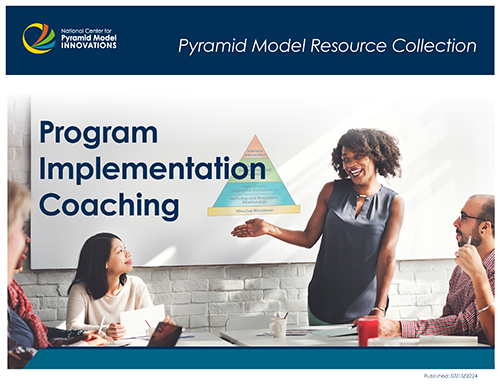
This NCPMI Program Implementation Coaches Resource Collection provides program implementation coaches with selected tools to support their work with state, community, and program-wide leadership teams.
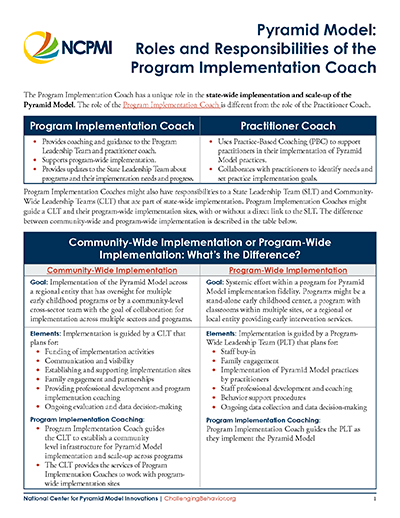
This fact sheet describes the various roles and responsibilities of Program Implementation Coaches and their work with state, community, and program leadership teams.
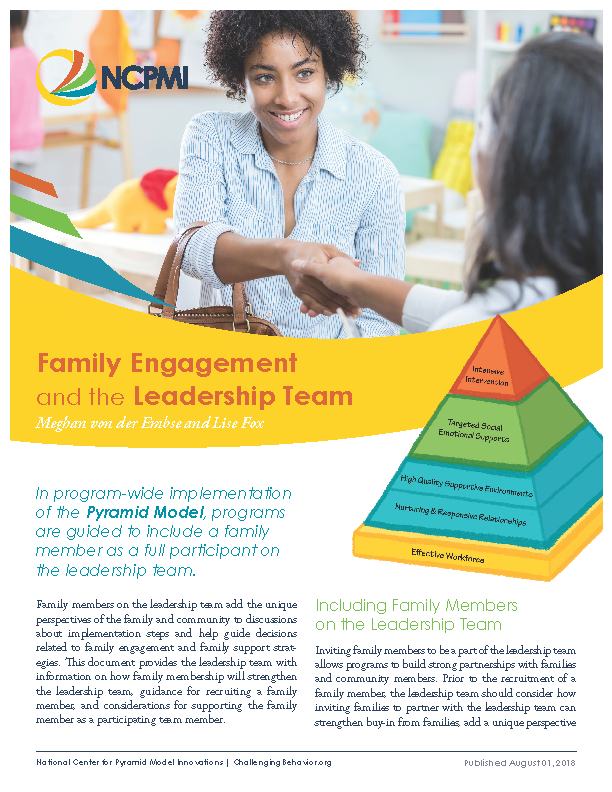
This article highlighting ways your Pyramid Model Leadership Team can partner with families.
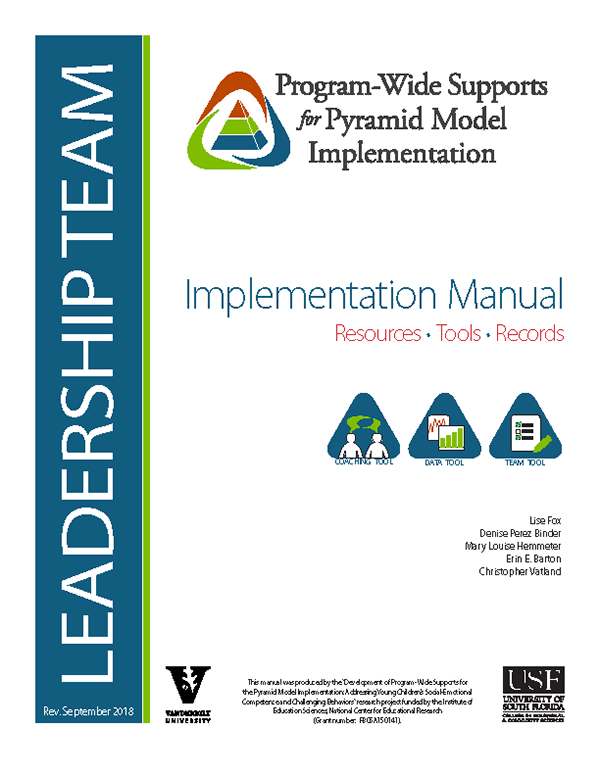
The Leadership Team Implementation Manual provides leadership teams with the resources, forms, and ideas to guide program-wide implementation of the Pyramid Model within classroom programs. Each section of the manual aligns to a critical element of the Early Childhood Program-Wide Benchmarks of Quality. The manual is ideally used by leadership teams in their initial training and monthly during leadership team meetings where they review and update their implementation action plans.
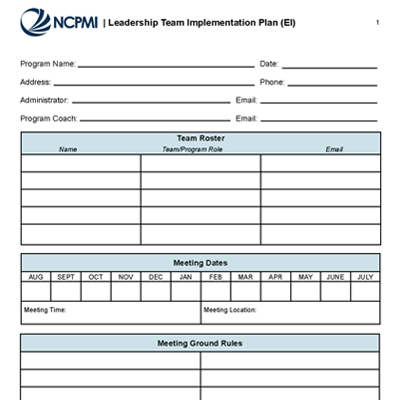
This form is used by Early Intervention Program Leadership Teams to write down their implementation action plans related to each benchmark of quality.

This form is used by Early Intervention Program Leadership Teams to write down their implementation action plans related to each benchmark of quality.
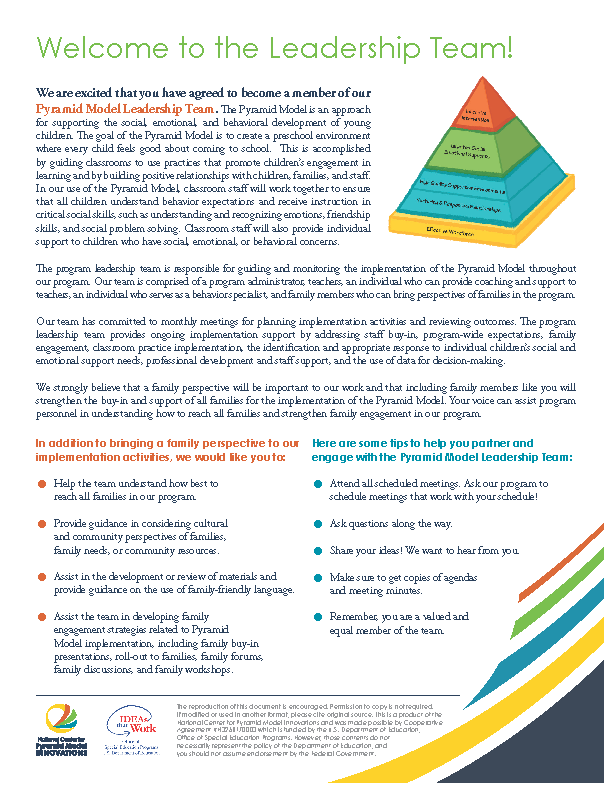
Adding family members to your Leadership Team? Make them?feel welcome with this family friendly handout that explains the leadership team and provides family members ideas on how to partner with the leadership team. This resource also makes a great family recruitment tool!
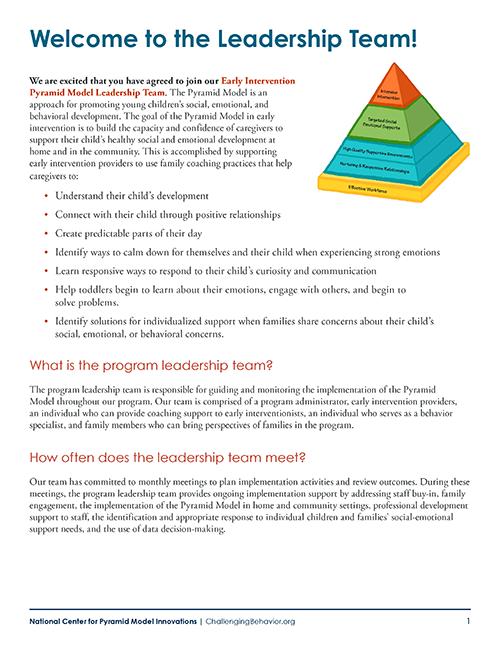
Adding family members to your Leadership Team? Make them?feel welcome with this family friendly handout that explains the leadership team and provides family members ideas on how to partner with the leadership team. This resource also makes a great family recruitment tool!
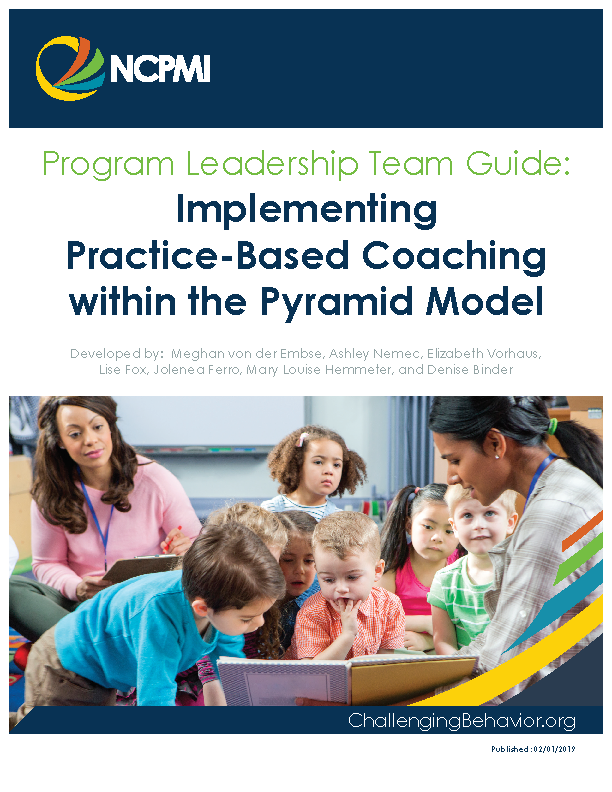
This resource provides Pyramid Model leadership teams with guidance for implementing Practice-Based Coaching within their programs and developing plans for three essential elements of coaching: 1) Getting Ready for Coaching; 2) Enacting Coaching; and 3) Evaluating Coaching.

This document provides program leadership teams with guidance to support their efforts to eliminate suspension and expulsion and promote equitable, inclusive and culturally responsive practice in all early childhood settings including public and private schools and child care centers.

Dr. Marilyn Torley, Principal at Clifton Early Learning Academy, a Pyramid Model program, describes their Leadership Team purpose, structure, and roles.

Dr. Marilyn Torley, Principal at Clifton Early Learning Academy, a Pyramid Model program, describes their Leadership Team purpose, structure, and roles.

This document is designed to guide the Program Leadership Team around considerations for supporting children, families, and staff as they return to the program. The guidance includes Pyramid Model practices you know and encourages you to think about those strategies from a trauma-informed perspective. While the leadership team may not know who among children, families, and staff have or are experiencing trauma, a trauma-informed approach guides programs in providing a safe and nurturing environment where children, families, and staff can build resilience, feel safe, and recover.

Principal Dr. Marilyn Torley, of the Clifton Early Learning Academy, explains how the Pyramid Model helps her to better support classroom teachers.

Principal Dr. Marilyn Torley, of the Clifton Early Learning Academy, explains how the Pyramid Model helps her to better support classroom teachers.

This tool can be used by practitioners working in a classroom to begin to open communication about how they are best able to work as a collaborative team.

Pyramid Model Classroom Coach Raquel Lima how embracing collaboration between the Program Leadership Team, staff, and families leads to positive outcomes.

Pyramid Model Classroom Coach Raquel Lima how embracing collaboration between the Program Leadership Team, staff, and families leads to positive outcomes.

This questionnaire helps colleagues learn about each other to build collaborative relationships.
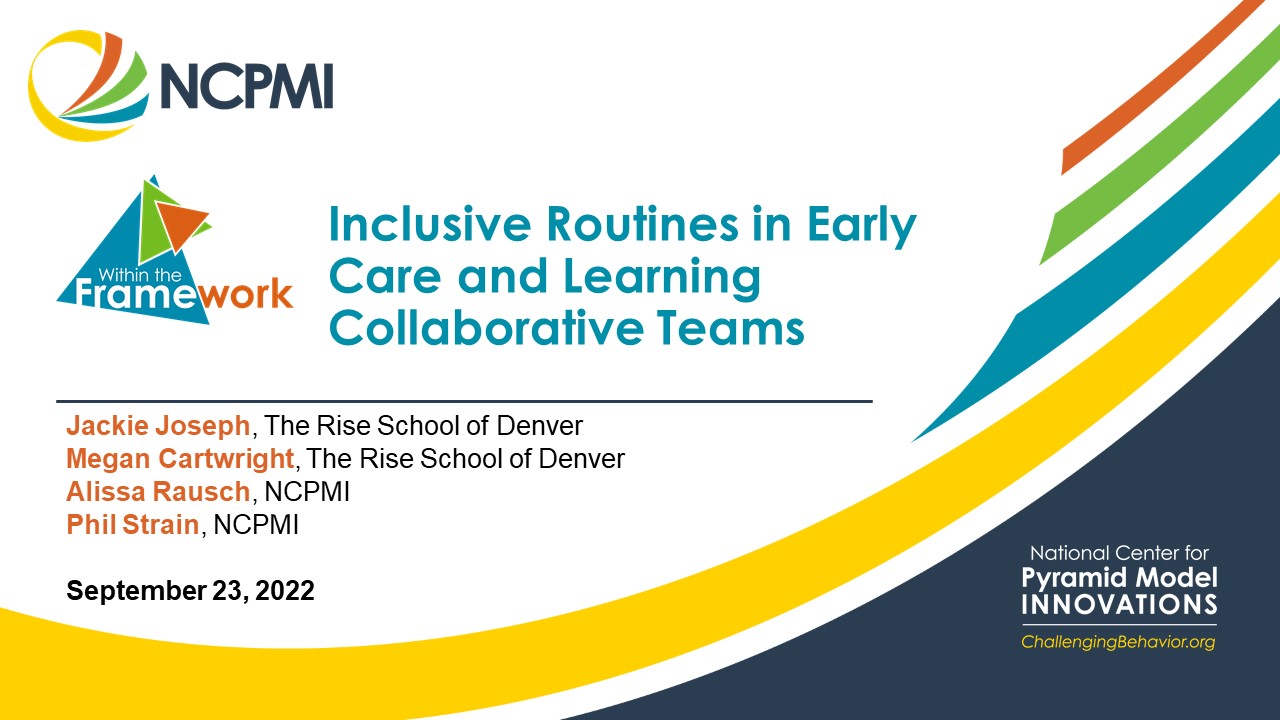
In this second of three webinars, we will explore how early care and learning providers and programs can use environmental routines to engage in coaching and collaborative teaming. Participants will learn how teams can use inclusive routines to benefit children’s development, to promote provider competence and confidence in using inclusive practices, and to positively impact workplace culture.
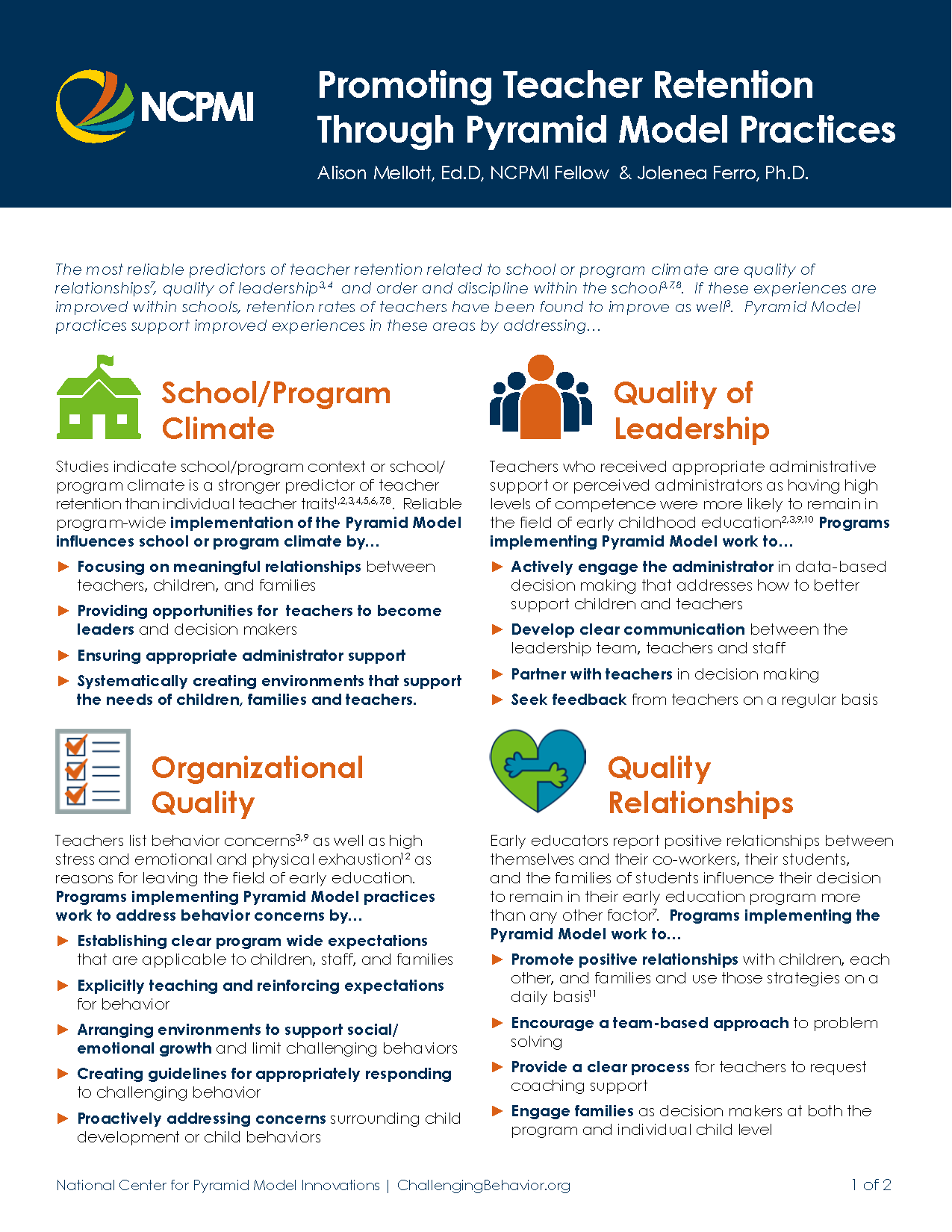
Early educator attrition is a significant challenge in many early learning programs. This guidance sheet outlines the link between Pyramid Model Practices and teacher retention research. Pyramid Model Practices can provide supports to encourage teachers to remain in the field.

When children engage in behavior that pushes your buttons, it is important to be intentional in how you respond. This resource provides strategies that you might use when a child’s behavior pushes your buttons to help you respond in a way that is supportive of the child.

A sample slide deck that can be used by leadership teams for a buy-in presentation. Includes a link to how to conduct a buy-in presentation.

Leadership teams can use this activity to get staff input on the program expectations.
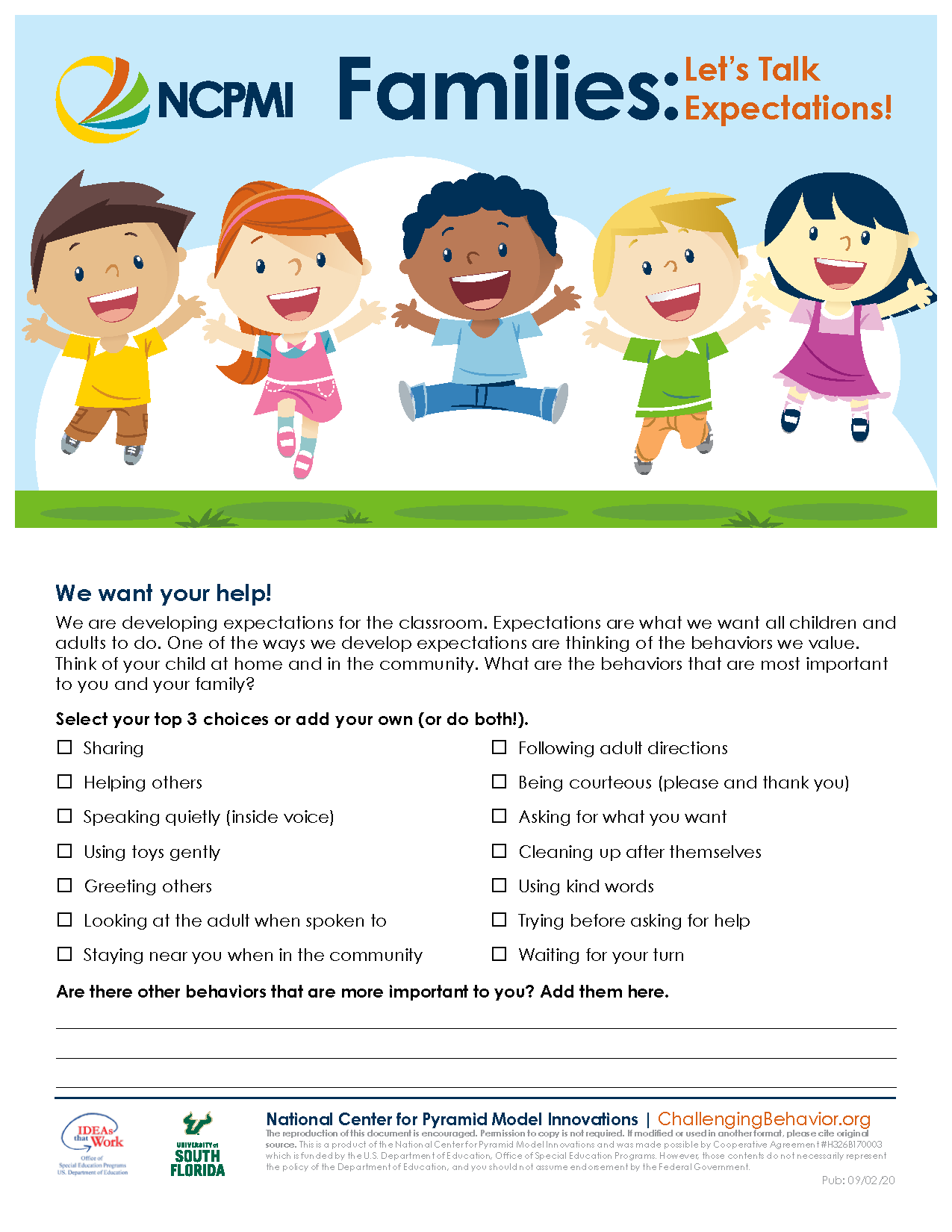
Leadership teams can use this handout to get family input on the program expectations.
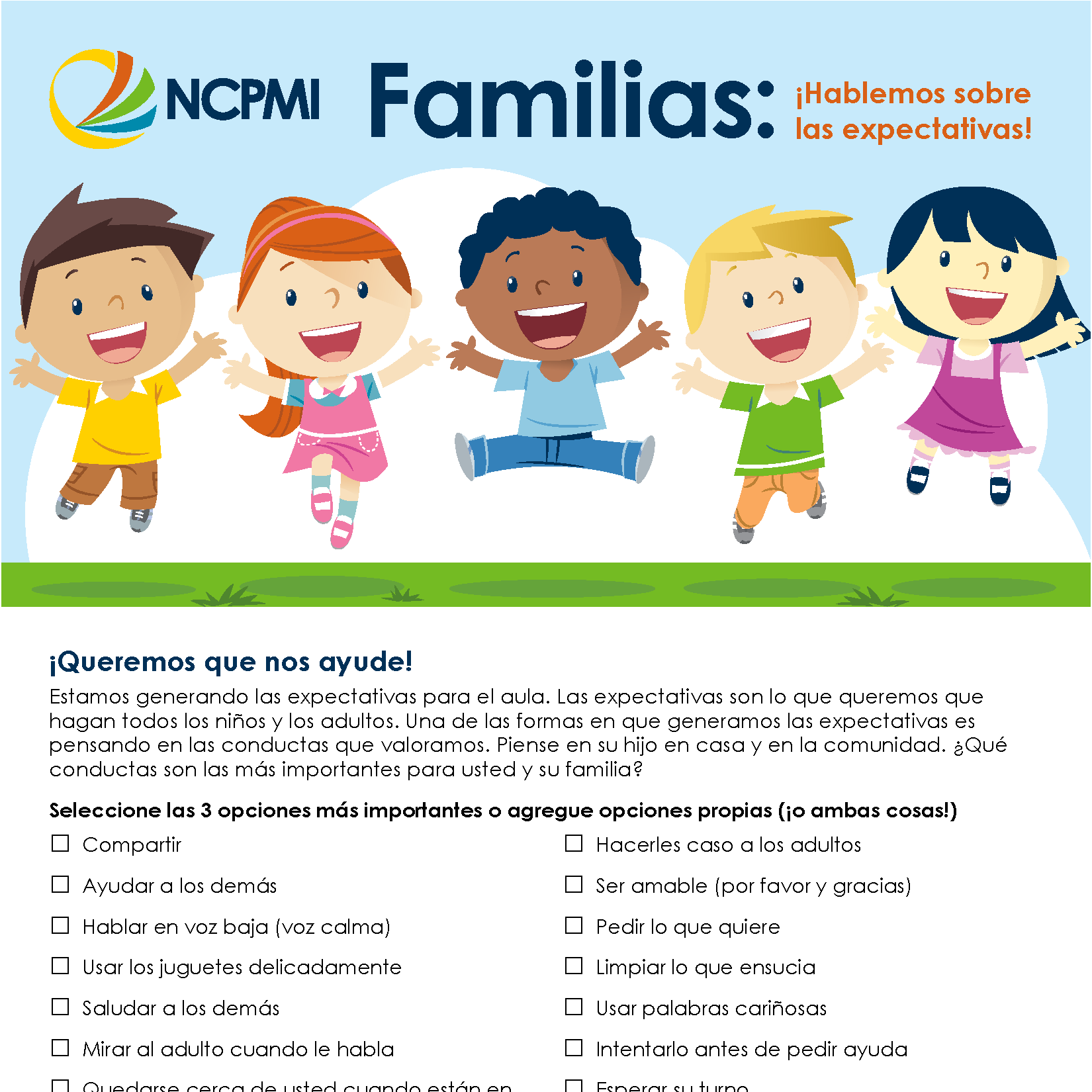
Leadership teams can use this handout to get family input on the program expectations.

This article highlighting ways your Pyramid Model Leadership Team can partner with families.
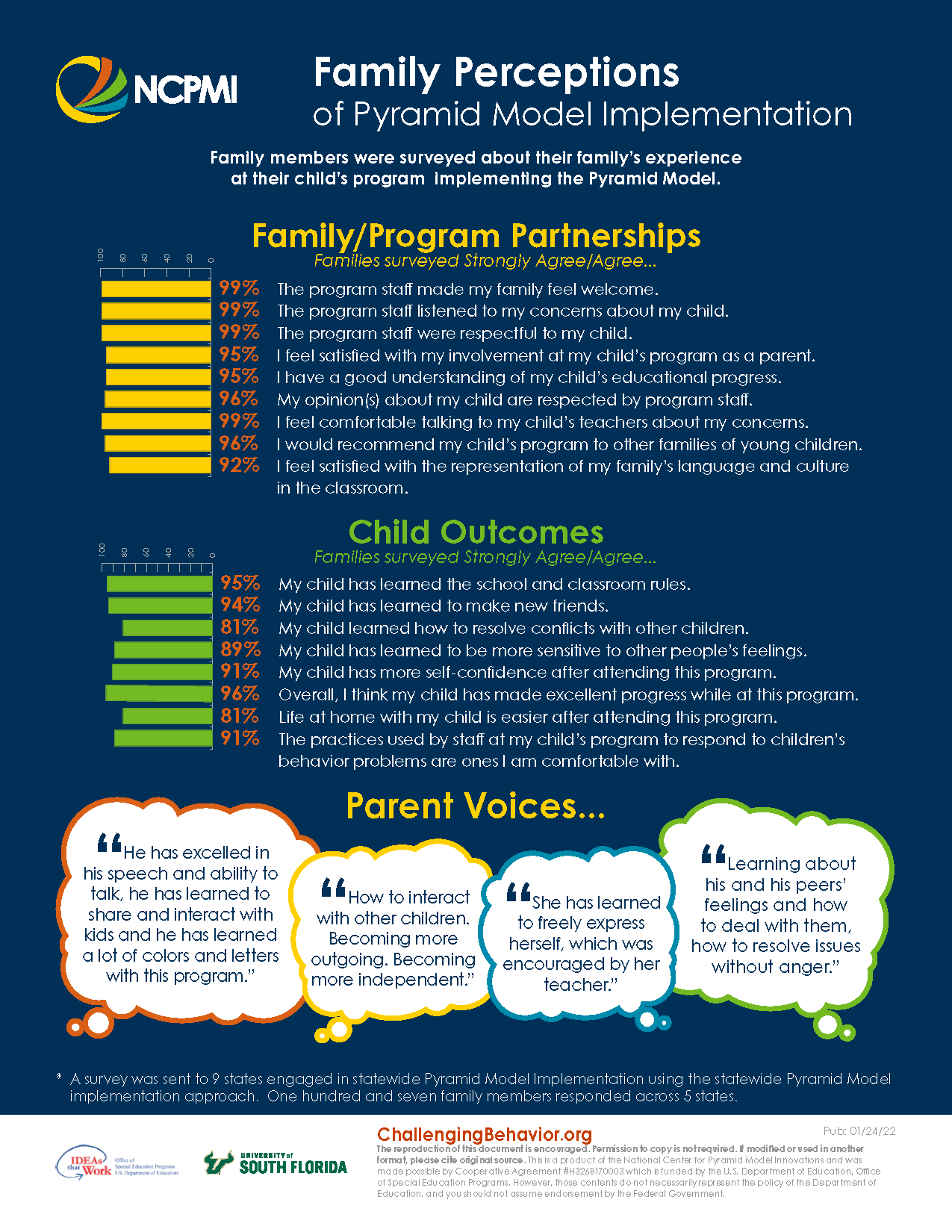
Family members were surveyed about their family’s experience at their child’s program implementing the Pyramid Model. This infographic shows the percent of families that agreed or strongly agreed with the statements reflecting family and program partnerships, and what their child has learned.
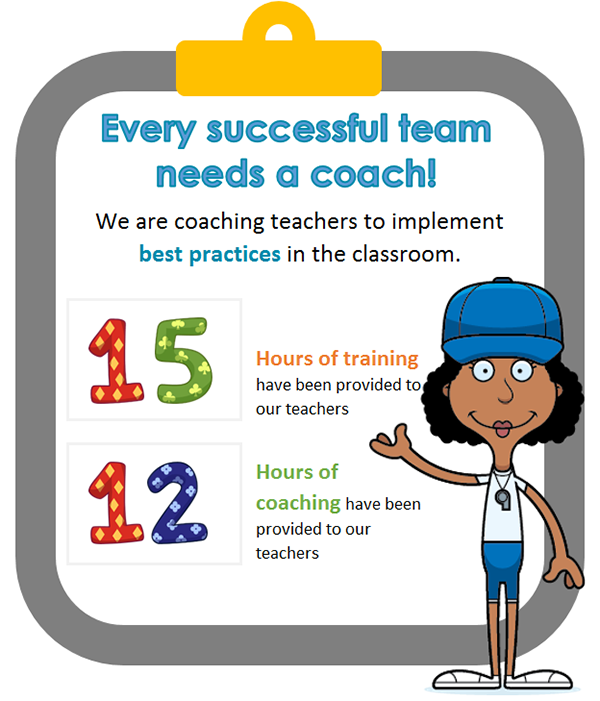
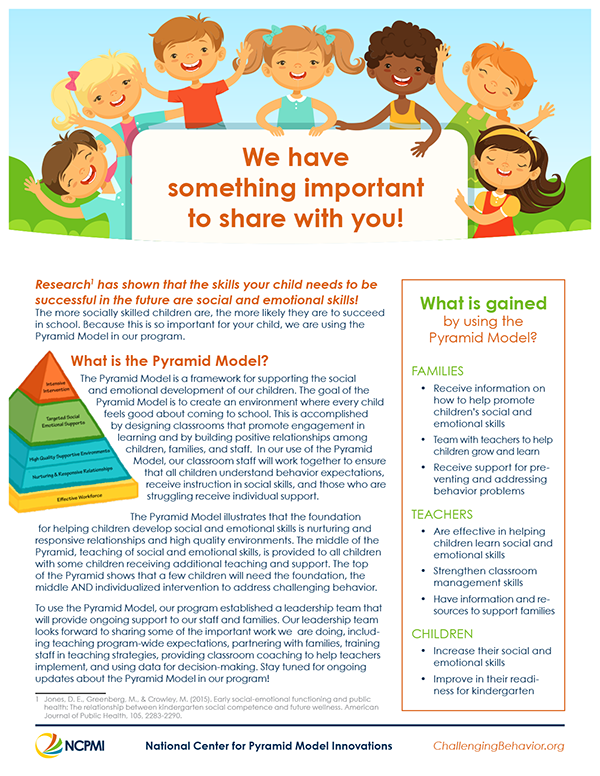
Programs can share this handout with families to inform them of their Pyramid Model implementation efforts.
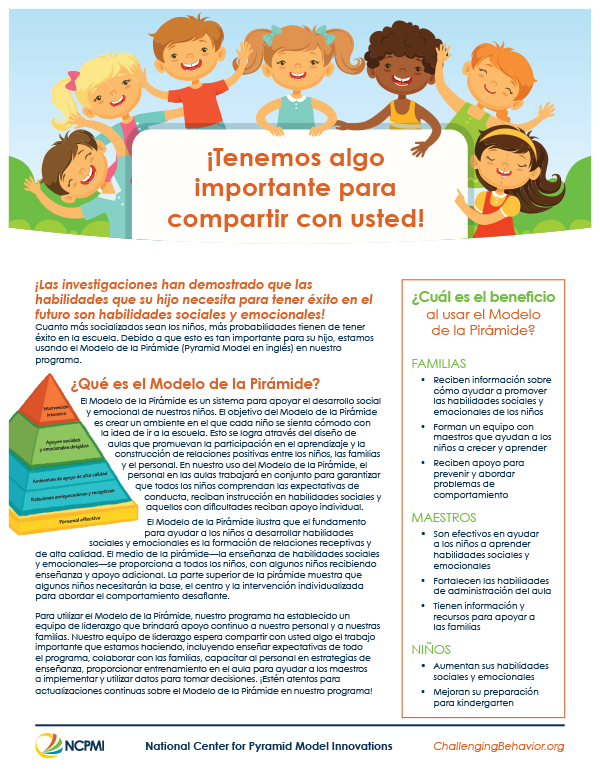
Programs can share this handout with families to inform them of their Pyramid Model implementation efforts.

Adding family members to your Leadership Team? Make them?feel welcome with this family friendly handout that explains the leadership team and provides family members ideas on how to partner with the leadership team. This resource also makes a great family recruitment tool!

Adding family members to your Leadership Team? Make them?feel welcome with this family friendly handout that explains the leadership team and provides family members ideas on how to partner with the leadership team. This resource also makes a great family recruitment tool!
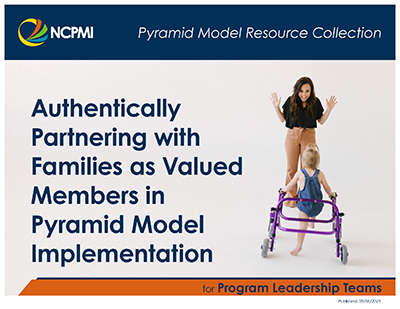
This resource collection offers information and materials for programs to use as they authentically partner with families to implement the Pyramid Model. These resources ensure that each family’s “voice and choice” is considered in the planning, development, and evaluation of Pyramid Model activities, programs, and systems.
Last Updated: 10/01/2024 ADA updates
Created: 09/08/2023
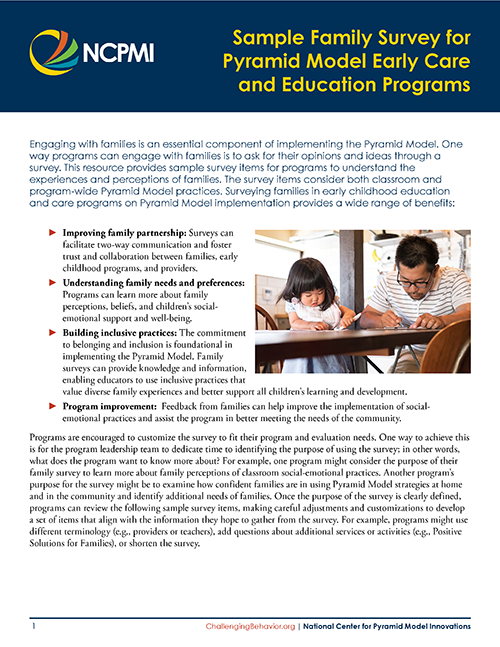
This resource provides sample survey items for programs to understand the experiences and perceptions of families. The survey items consider both classroom and program-wide Pyramid Model practices.

This set of tips and strategies helps practitioners navigate sensitive or difficult conversations with families. Guidance includes ideas for strengthening relationships with families using the 4Rs: Recognize, Reflect, Regulate, and Repair.
Program-Wide Resources
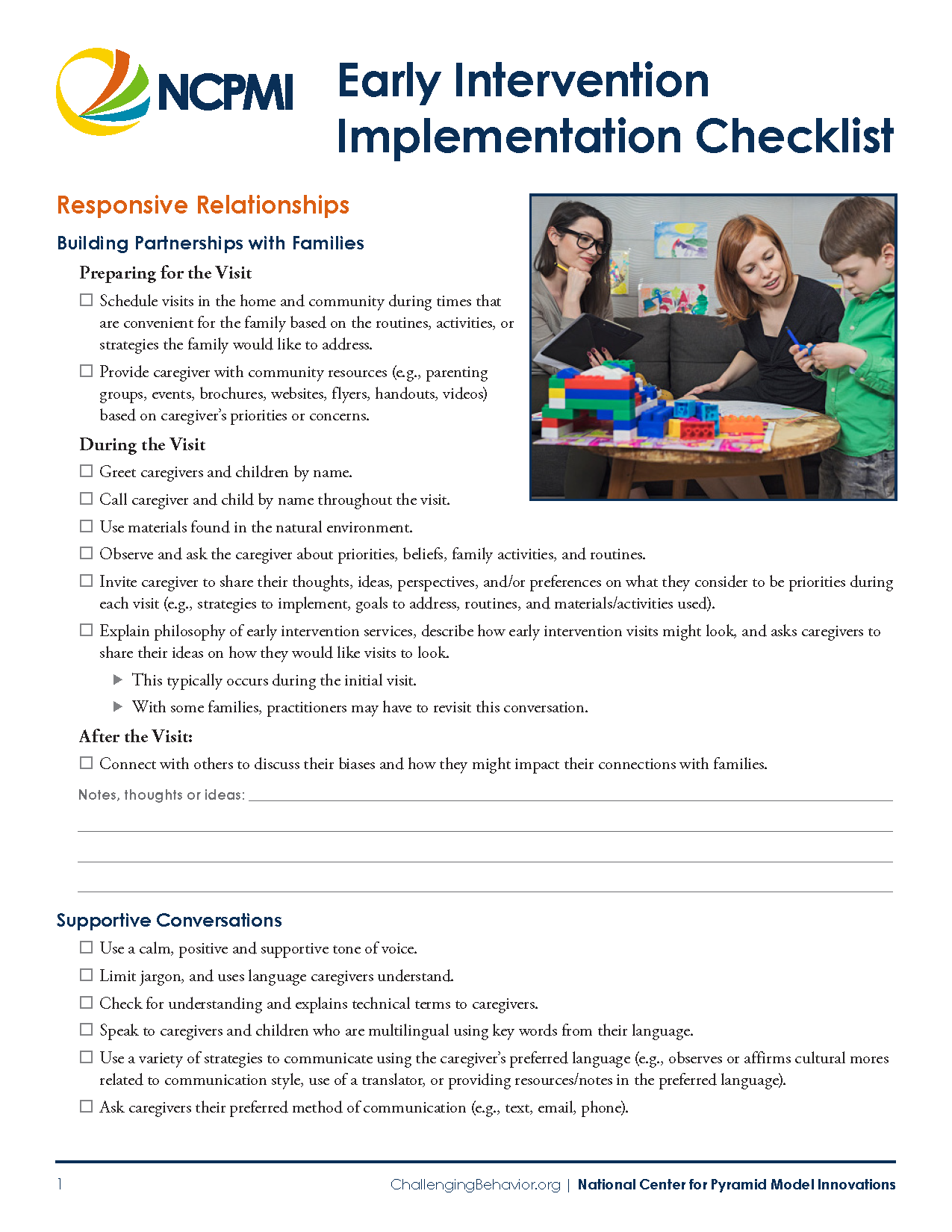
The Early Intervention Implementation Checklist is designed to align with the Early Intervention Pyramid Practices Fidelity Instrument (EIPPFI). Coaches and early interventionists can use this tool to support early interventionists’ self-reflection of the implementation of Pyramid practices, and prepare for shared goals and action planning.

This checklist accompanies the Practice-Based Coaching and the Pyramid Model Family Agreement. The checklist will help coaches and early intervention providers create a plan to communicate the purpose and the process of Practice-Based Coaching (PBC) to families while providing families the choice to participate. Below are actions to consider in preparing for and engaging in conversation with families around PBC in early intervention.
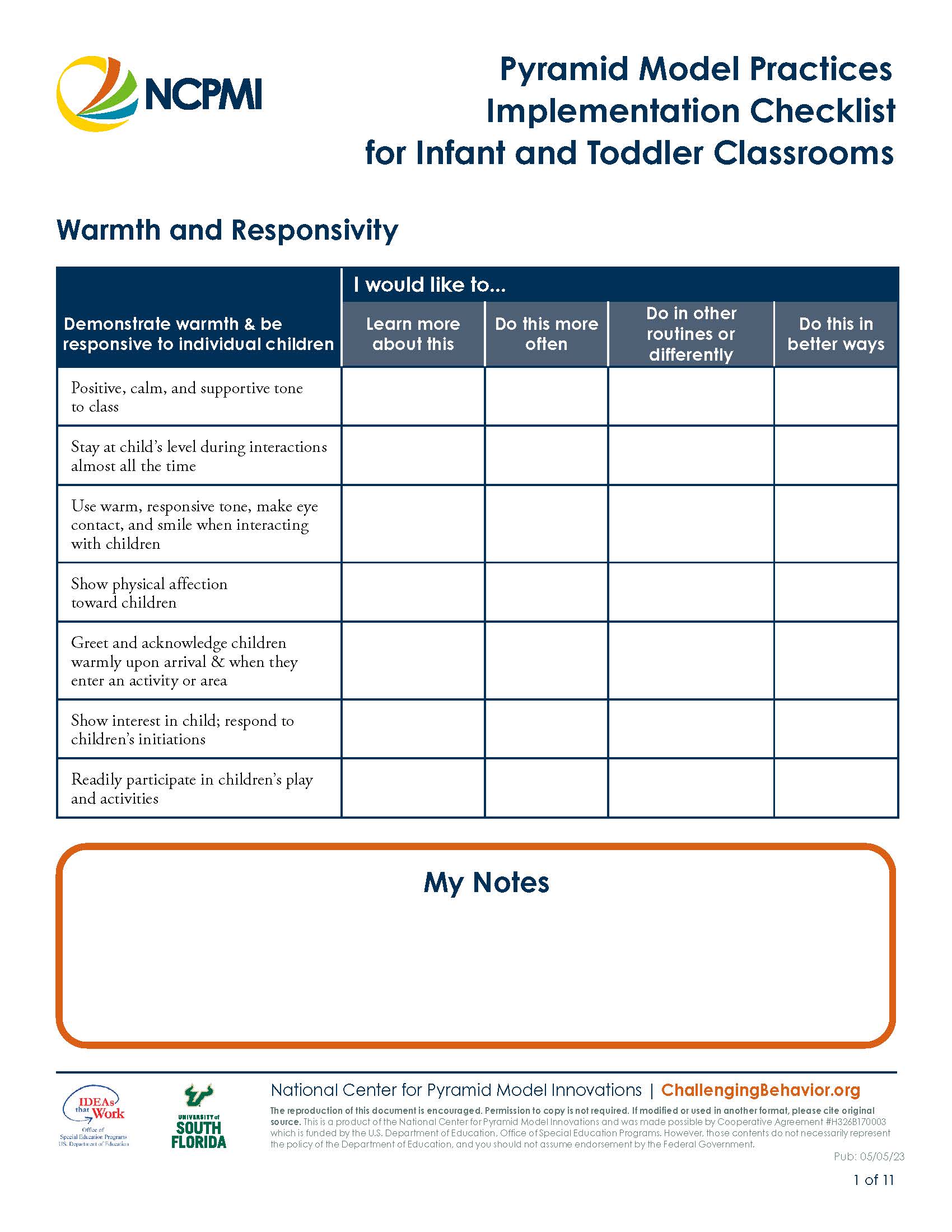
The Pyramid Model Practices Implementation Checklist for Infant and Toddler Classrooms is a tool designed to be used by practitioners to identify training and/or classroom implementation needs in eight areas. The checklist encourages individual self-reflection and discussion between classroom teachers and practitioner coaches.
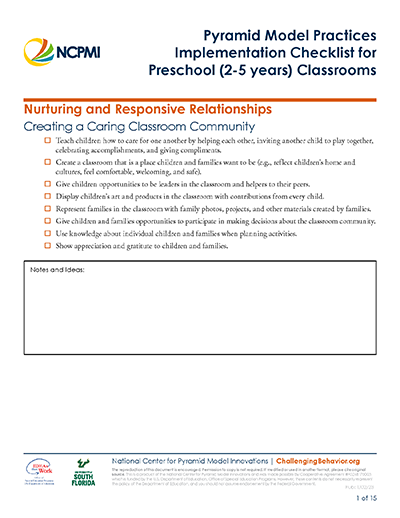
The Pyramid Model Implementation Checklist is a tool designed to be used by practitioners to identify training and/or classroom implementation needs in seven areas: Responsive Relationships; Predictable Daily Schedules; Creating Effective Classroom Routines; Teaching Behavior Expectations across Classroom Routines; Teaching Social and Emotional Skills; Systematic Instructional Strategies; and Function-Based Assessment and Intervention Planning. The checklist encourages individual self-reflection and discussion between classroom teachers and practitioner coaches.
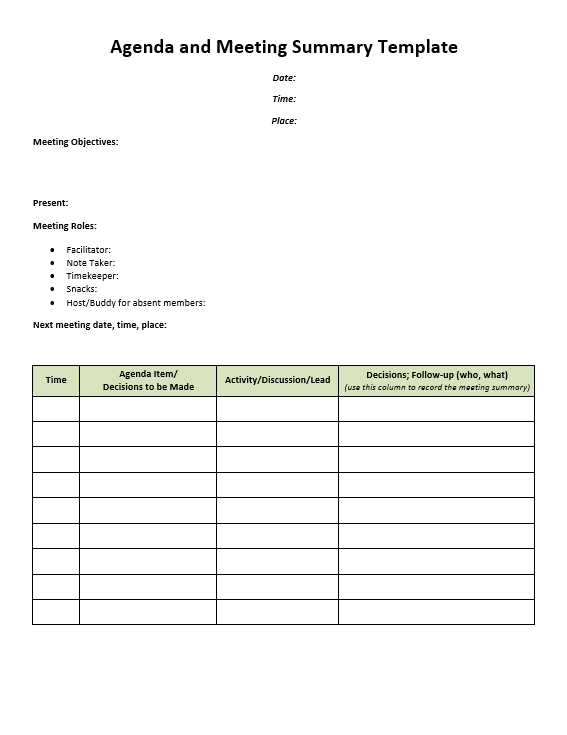
Sample agenda template for team meetings.

Principal Dr. Marilyn Torley, of the Clifton Early Learning Academy, explains how the Pyramid Model helps her to better support classroom teachers.

Principal Dr. Marilyn Torley, of the Clifton Early Learning Academy, explains how the Pyramid Model helps her to better support classroom teachers.
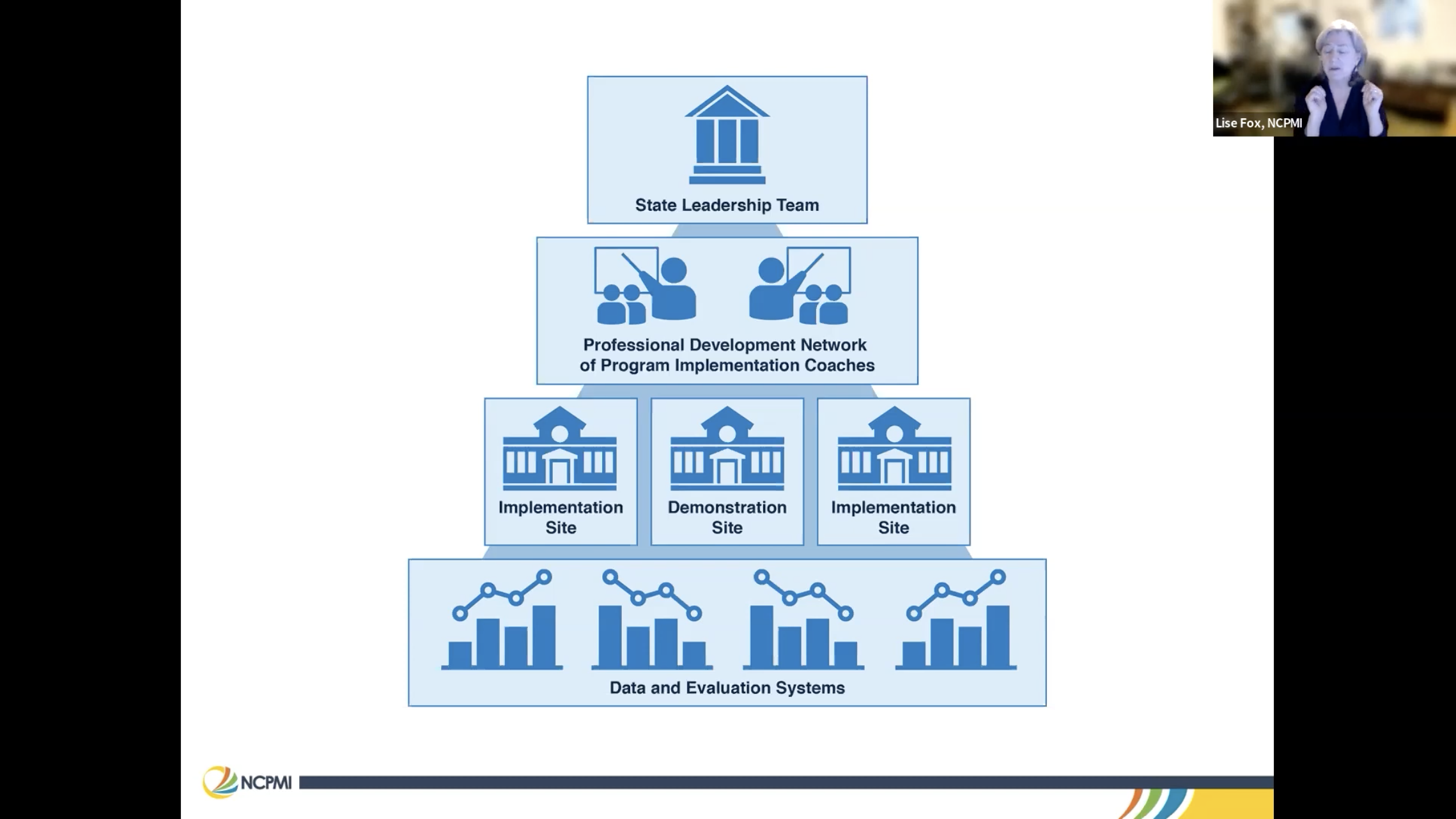
Are you implementing the Pyramid Model in your program or are you just getting started? Data are an important part of Pyramid Model implementation and data decision-making. This webinar will focus on the why, what, when and how of collecting and using data in your program. Presenters will discuss systems and structures programs should consider and provide resources to make sure you can make the most of the data you collect.
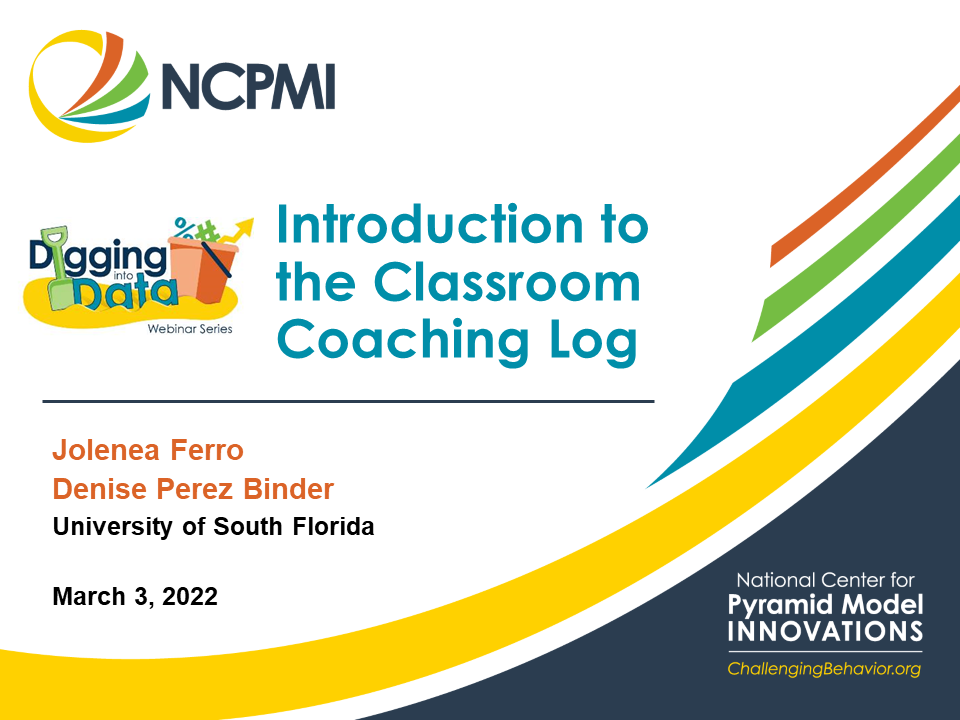
Are you implementing the Pyramid Model in your program or are you just getting started? Data are an important part of Pyramid Model implementation and data decision-making. This webinar will provide an in-depth review of the Classroom Coaching Log and how data from the log can be used to help coaches better understand successful coaching supports and how strategies might be changed to improve teacher practices.

A critical part to monitoring implementation of the Pyramid Model Framework is reviewing and action-planning around classroom implementation data. The Teaching Pyramid Observation Tool (TPOT) and Teaching Pyramid Infant-Toddler Observation Scale (TPITOS) provides practitioner coaches concrete information as to how teachers are implementing Pyramid practices in the classroom. After collecting this information coaches, with teachers can build personal action plans that meet the needs of the teacher and their specific classroom. The measure outlines the critical elements of Pyramid Model implementation, and it allows the coach and practitioner to discuss and plan for implementation of each level of the Pyramid. In this webinar, participants will learn about the features of the these fidelity measures, review instructions for administration, and discuss possible actions gleamed from the data.

Lise Fox discusses the guidance in NCPMI’s Leadership Team Guide for Re-Opening Programs and other re-opening resources.

Pyramid Model Classroom Coach Raquel Lima how embracing collaboration between the Program Leadership Team, staff, and families leads to positive outcomes.

Pyramid Model Classroom Coach Raquel Lima how embracing collaboration between the Program Leadership Team, staff, and families leads to positive outcomes.
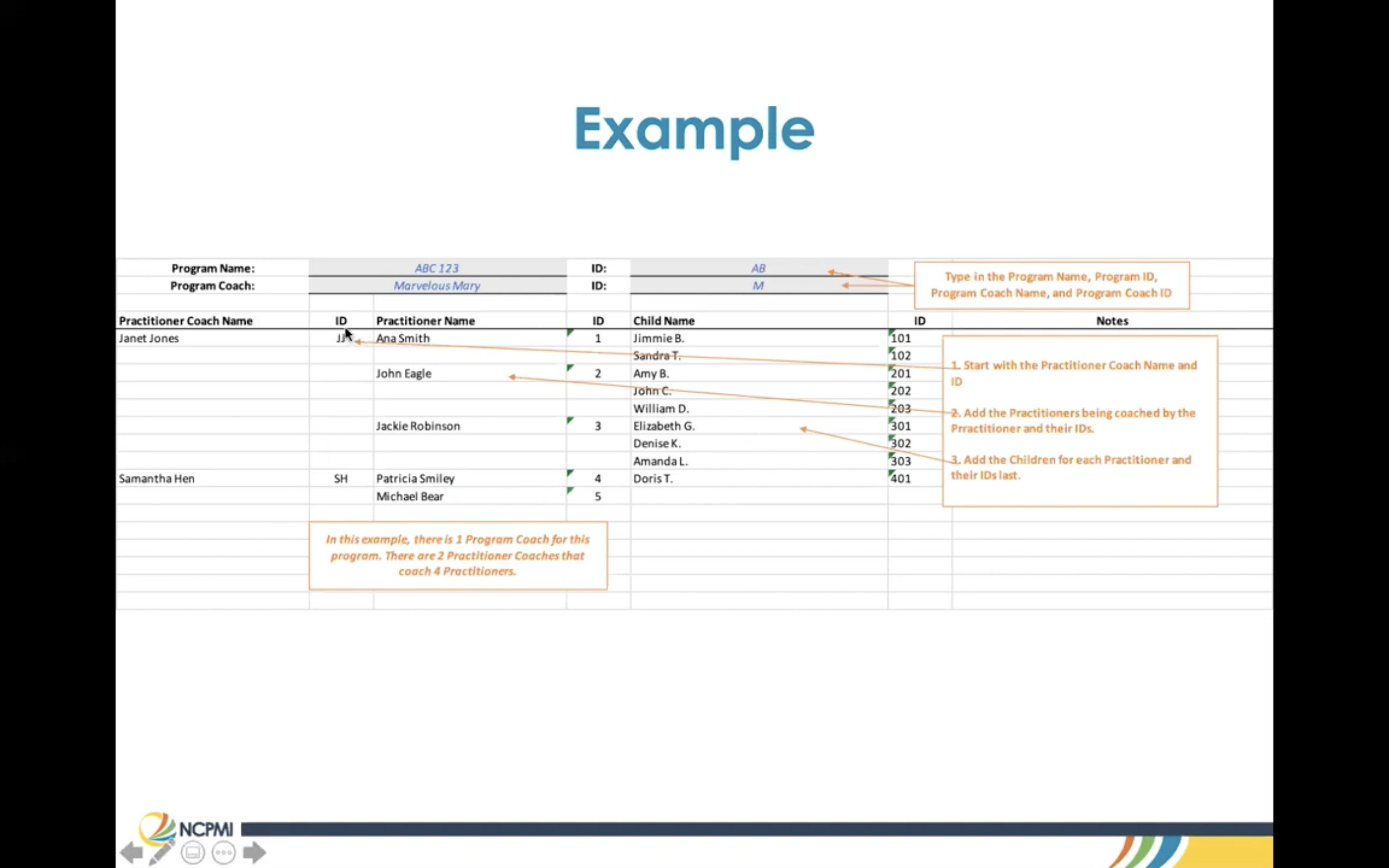
This tutorial goes through creating unique identification codes for program staff and children to be used with the various Pyramid Model data tools.

Dr. Mariyn Torley, Principle of Clifton Early Learning Academy, explains how the Pyramid Model practices and using data-based decision-making helps to make effective change within her school.

Dr. Mariyn Torley, Principle of Clifton Early Learning Academy, explains how the Pyramid Model practices and using data-based decision-making helps to make effective change within her school.

In this second of three webinars, we will explore how early care and learning providers and programs can use environmental routines to engage in coaching and collaborative teaming. Participants will learn how teams can use inclusive routines to benefit children’s development, to promote provider competence and confidence in using inclusive practices, and to positively impact workplace culture.

Overview of what a Pyramid Model Program Coach is, their requirements and responsibilities.

Overview of what a Pyramid Model Program Coach is, their requirements and responsibilities.
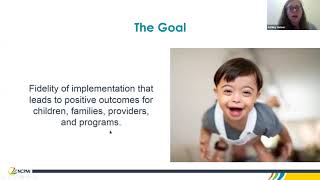
The National Center for Pyramid Model Innovations has developed a framework, practices and tools to support implementation of the Pyramid Model by Part C, Early Intervention programs. This webinar describes the framework, critical elements, practices, and fidelity tools that can be used to support program-wide implementation and early interventionists? practices. The program-wide implementation framework and critical elements were designed to be implemented within the multiple types of service delivery models used across Early Intervention Programs and states. The early interventionists? practices are focused on building families? confidence and competence in supporting their child’s social emotional development. This webinar may be helpful for Part C state leaders, program leaders, and early interventionists to identify which program wide elements are already in place, which Pyramid Model practices their staff are already using well, and next steps for their programs or individual goals.

Pyramid Model Classroom Coach Raquel Lima describes how positive outcomes improve to a greater degree when the Pyramid Model is implemented across a whole school or program.

Pyramid Model Classroom Coach Raquel Lima describes how positive outcomes improve to a greater degree when the Pyramid Model is implemented across a whole school or program.

Dr. Marilyn Torley, Principal at Clifton Early Learning Academy gives a heartfelt explanation of what she is most proud of now that her program implements the Pyramid Model.

Dr. Marilyn Torley, Principal at Clifton Early Learning Academy gives a heartfelt explanation of what she is most proud of now that her program implements the Pyramid Model.

Dr. Marilyn Torley, Principal at Clifton Early Learning Academy, a Pyramid Model program, describes their Leadership Team purpose, structure, and roles.

Dr. Marilyn Torley, Principal at Clifton Early Learning Academy, a Pyramid Model program, describes their Leadership Team purpose, structure, and roles.

Pyramid Model Classroom Coach Raquel Lima discusses using data in the coaching process.

Pyramid Model Classroom Coach Raquel Lima discusses using data in the coaching process.
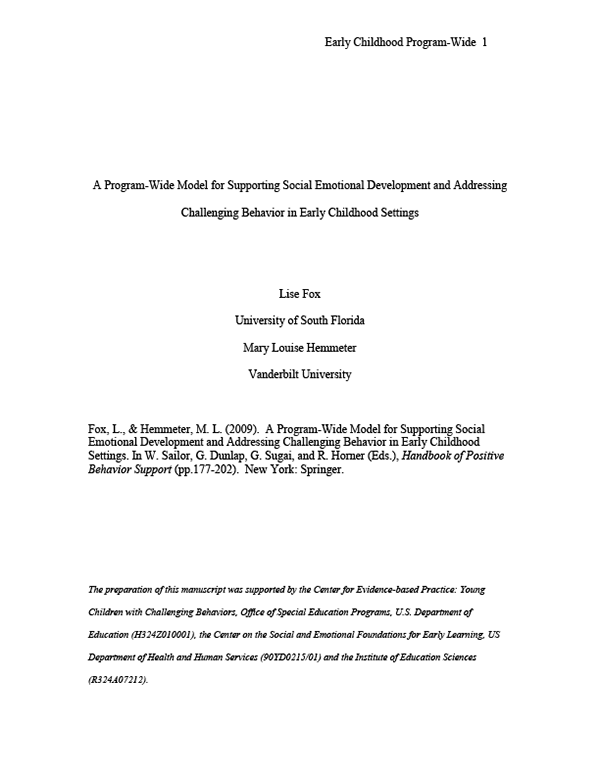
By Fox, L., & Hemmeter, M. L. (2009). In W. Sailor, G. Dunlap, G. Sugai, and R. Horner (Eds.), Handbook of Positive Behavior Support (pp.177-202). New York: Springer. (This book is available for purchase from the Springer website).
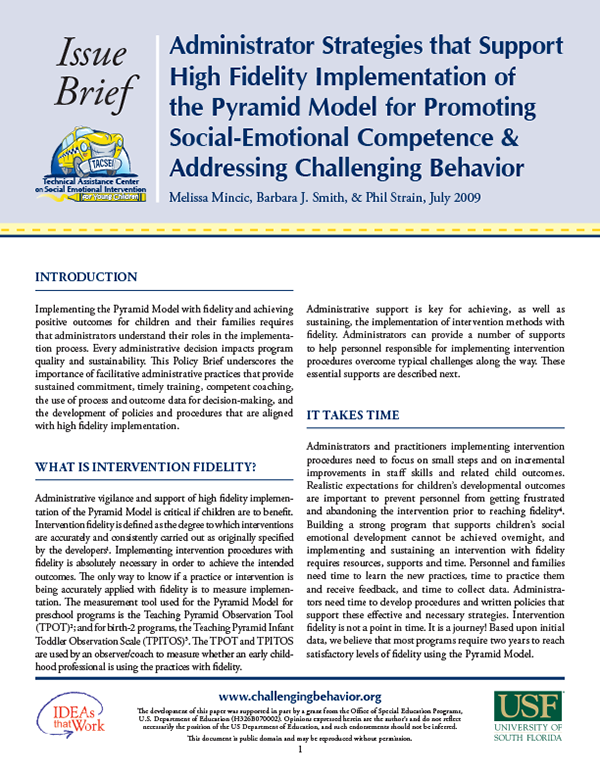
Implementing the Pyramid Model with fidelity and achieving positive outcomes for children and their families requires that administrators understand their roles in the implementation process. Every administrative decision impacts program quality and sustainability. This issue brief underscores the importance of facilitative administrative practices that provide sustained commitment, timely training, competent coaching, the use of process and outcome data for decision-making, and the development of policies and procedures that are aligned with high-fidelity implementation (July, 2009).
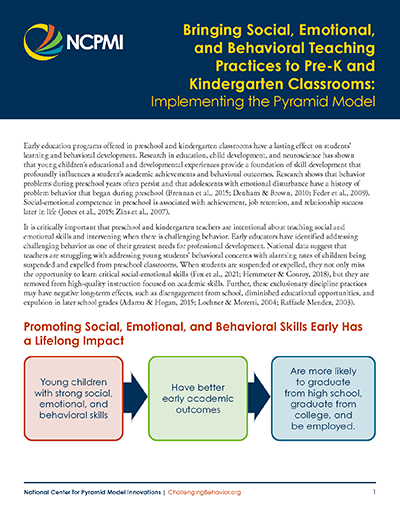
A brief that describes the research supporting the implementation of Pyramid Model practices in preschool and kindergarten classrooms.
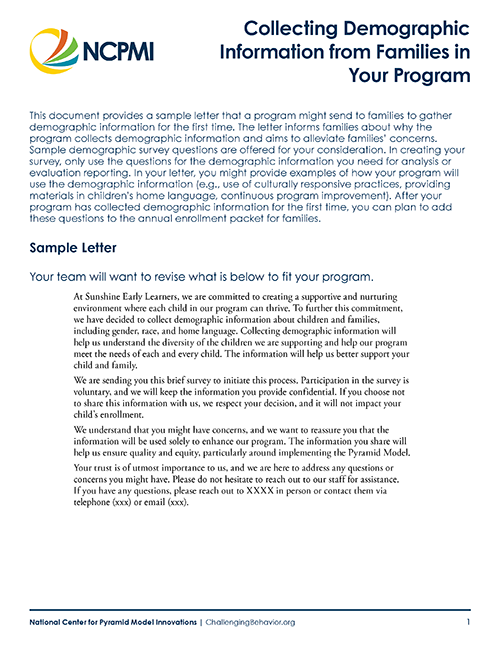
This document provides programs with guidance and sample questions for to collect demographic information for children enrolled in the program.
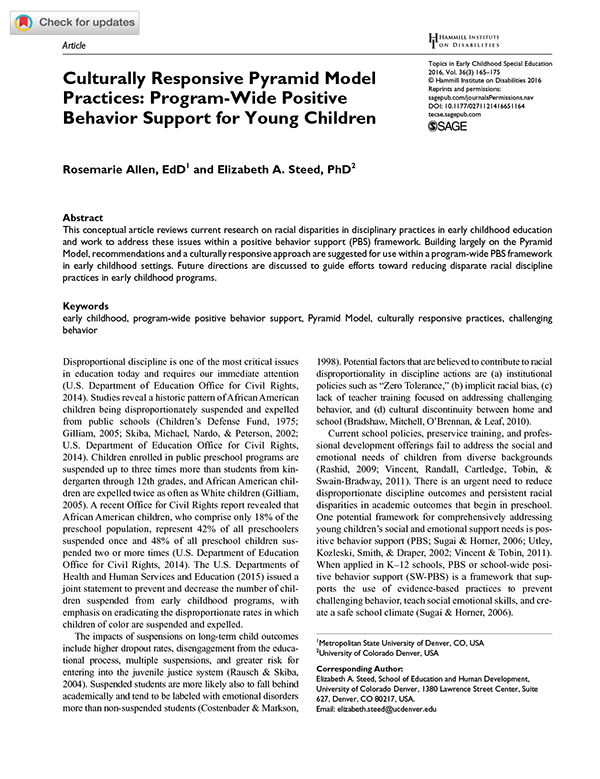
Allen, R., & Steed, E. A. (2016). Culturally responsive Pyramid Model practices: Program-Wide positive behavior support for young children. Topics in Early Childhood Special Education, 36, 165, 175.
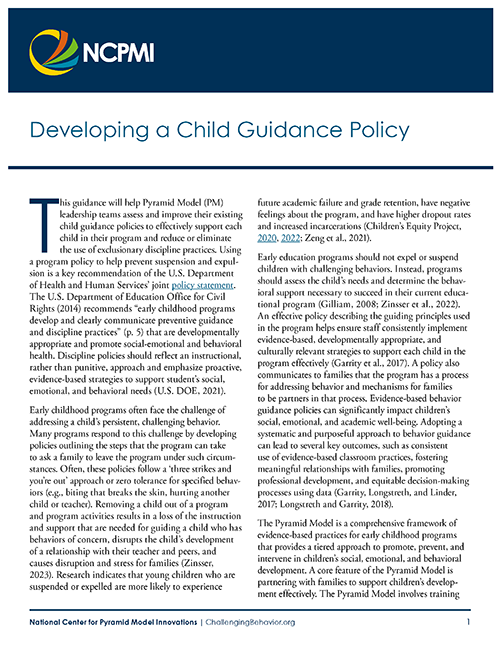
This guidance will help Pyramid Model (PM) leadership teams assess and improve their existing child guidance policies to effectively support each child in their program and reduce or eliminate the use of exclusionary discipline practices.
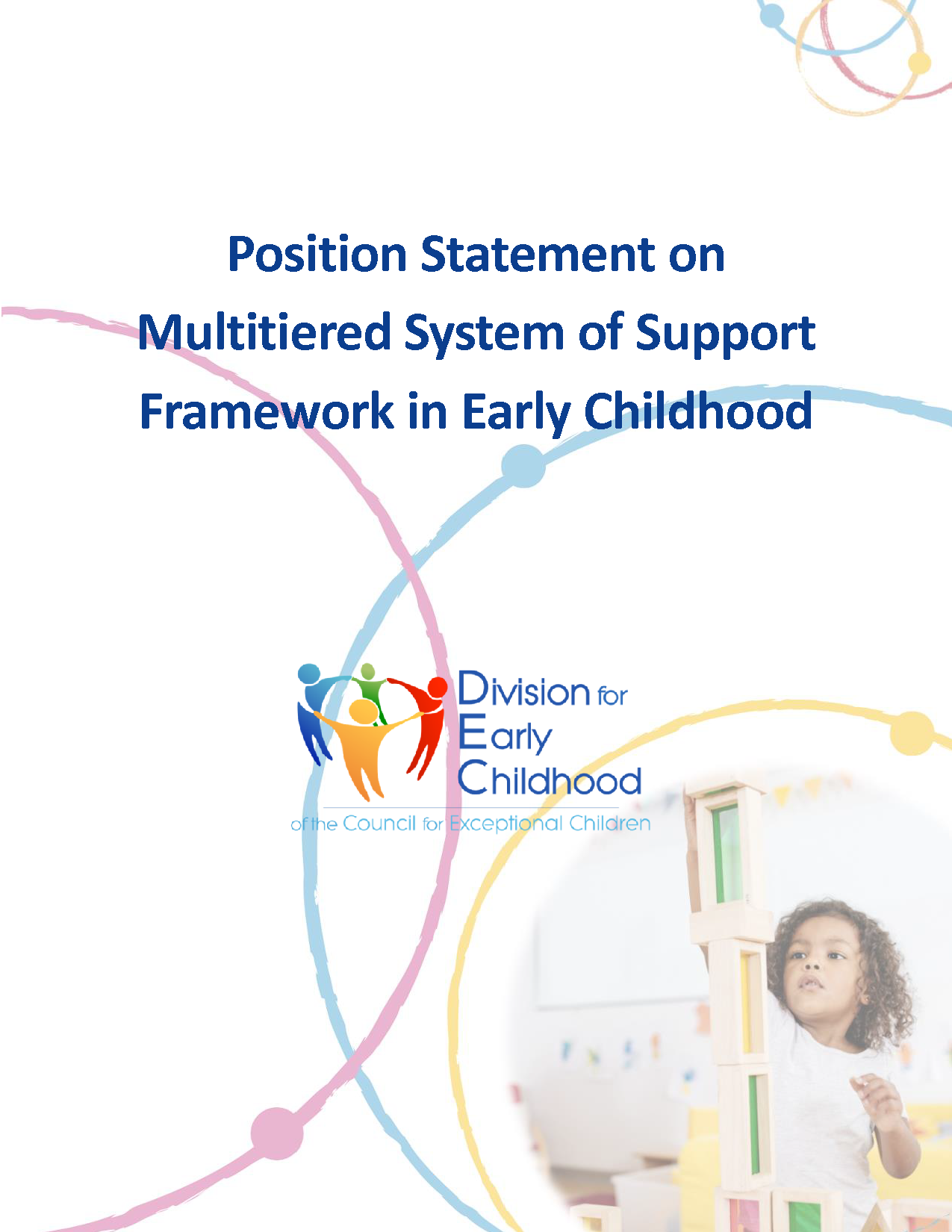
This position statement has been developed by the Division for Early Childhood of the Council for Exceptional Children.?The purpose of the revised statement is to define an early childhood multitiered system of support?(MTSS) framework and to promote a broader understanding and discussion of the implications for young children, their families, and those who serve them.
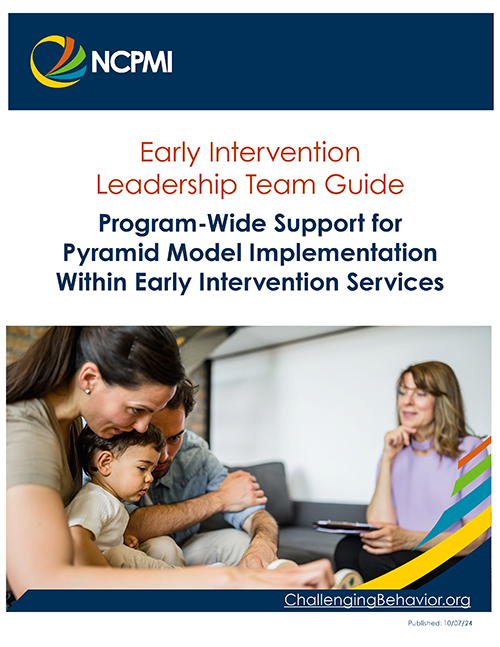
The Early Intervention Leadership Team Guide provides leadership teams with the resources, forms, and ideas to guide program-wide implementation of the Pyramid Model within early intervention services. Each section of the guide aligns to a critical element of the Pyramid Model Early Intervention (Part C) Benchmarks of Quality. The guide is ideally used by leadership teams in their initial training and monthly during leadership team meetings where they review and update their implementation action plans.
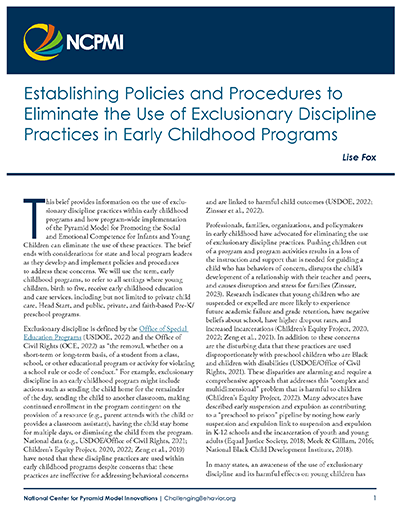
This brief provides information on the use of exclusionary discipline practices within early childhood programs and how program-wide implementation of the Pyramid Model for Promoting the Social and Emotional Competence for Infants and Young Children can eliminate the use of these practices.
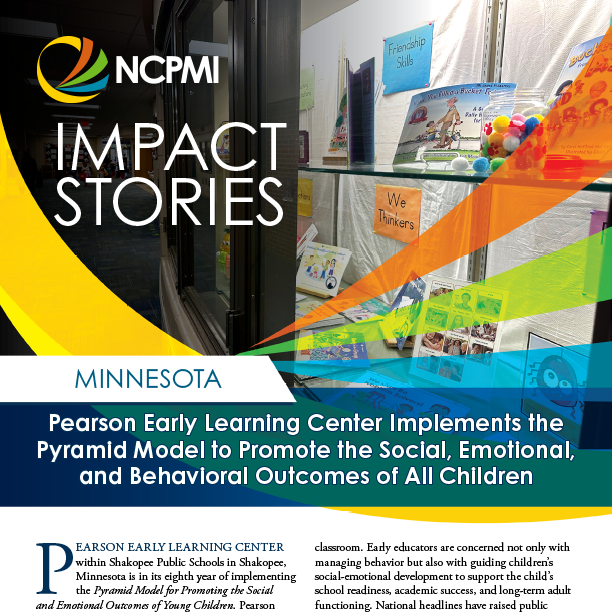
Pearson Early Learning Center Implements the Pyramid Model to Promote the Social, Emotional, and Behavioral Outcomes of All Children (Shakopee Public Schools | Shakopee, Minnesota)

This handout can be used to guide early intervention providers to communicate the purpose and process of Practice-Based Coaching (PBC) to families while providing families with the choice to participate. Families can be provided a copy of the handout during a scheduled visit, and early intervention providers should engage in a discussion with families around the talking points outlined in the document. The Early Interventionist Checklist for Reviewing Practice-Based Coaching with Families can be used with this handout to help early interventionists and their practitioner coaches to prepare for discussions with families around PBC.
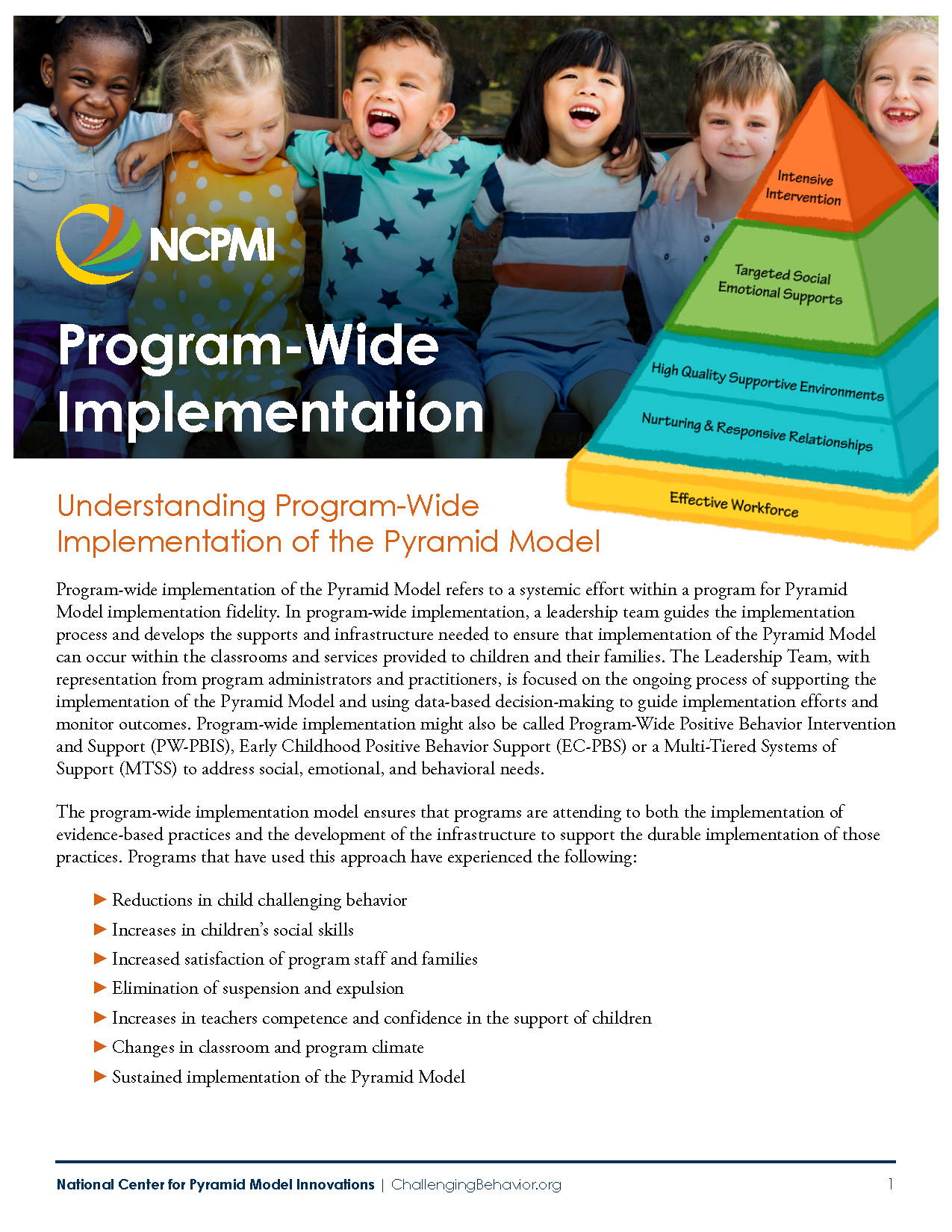
Overview of program-wide implementation to use in the recruitment of implementation sites. Describes components, considerations, and addresses frequently asked questions.
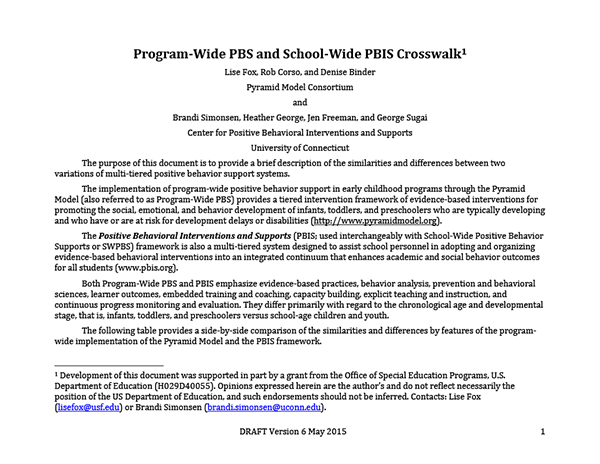
The purpose of this document is to provide a brief description of the similarities and differences between two variations of multi-tiered positive behavior support systems.
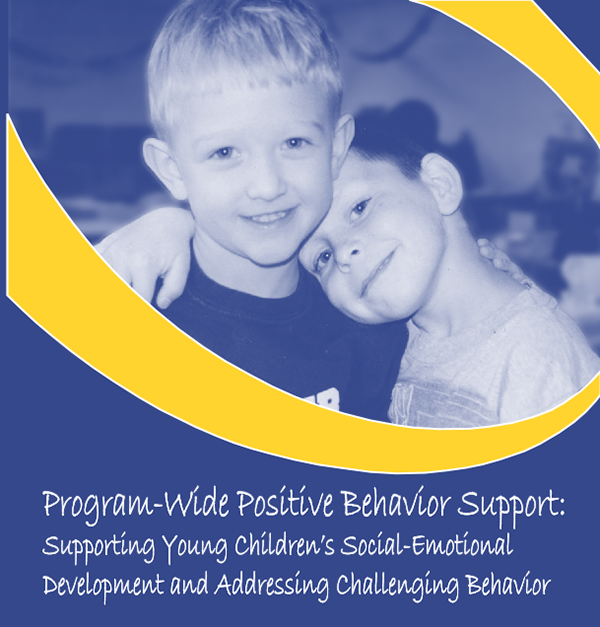
This booklet provides a report on the program-wide implementation of the “Teaching Pyramid” within a Head Start Program. The Southeast Kansas Community Action Program (SEK-CAP) provides information on the implementation of the model and the outcomes for the children, families, teachers, and program.
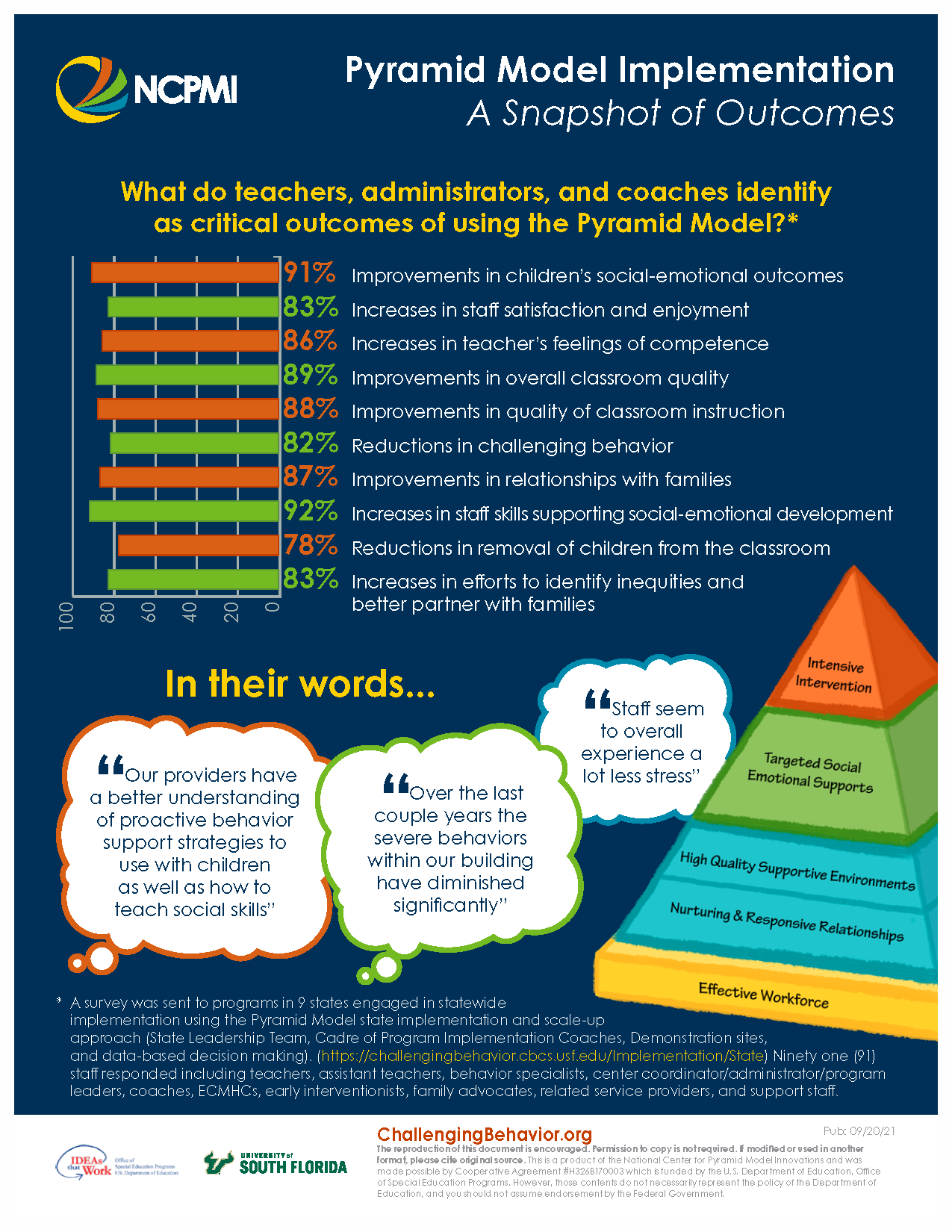
This infographic represents data compiled from a survey sent to programs in 9 states engaged in statewide implementation using the Pyramid Model state implementation and scale up plan. The resource can be used by state and program leaders wishing to implement the Pyramid Model as a tool for awareness, marketing and to solicit funding. It can also be used as a tool to share the benefits of Pyramid Model with families and community members.
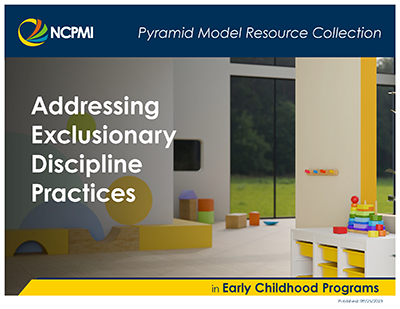
This NCPMI Resource Collection provides resources for states, communities and early childhood programs aimed to prevent the use of exclusionary practices. The resources, predominantly found on the NCPMI website, provide information about exclusionary practices related to prevention, policies, data tools, equity and impact. Formats include guides, tip sheets, fact sheets, webinars, and video.
Last Updated: 10/01/2024 ADA updates
Created: 09/25/2023

This NCPMI Program Implementation Coaches Resource Collection provides program implementation coaches with selected tools to support their work with state, community, and program-wide leadership teams.

This fact sheet describes the various roles and responsibilities of Program Implementation Coaches and their work with state, community, and program leadership teams.
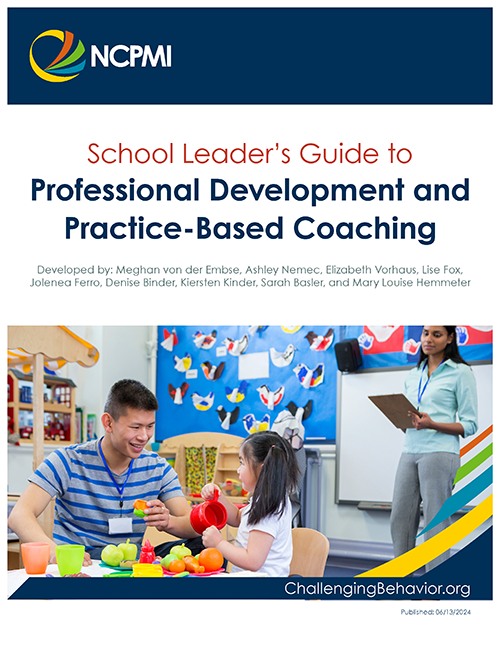
This guide provides school leaders with important considerations as they implement coaching as a component of professional development in their Pyramid Model implementation.

This guide provides resources that support early childhood professionals to integrate the Pyramid Model practices and trauma-informed care. The intended audience includes program leaders and administrators, educators, and staff in early intervention and early childhood classrooms. The purpose of this guide is to help early childhood professionals apply the principles of trauma-informed care in various settings to meet the diverse needs of young children and their families who have experienced trauma.
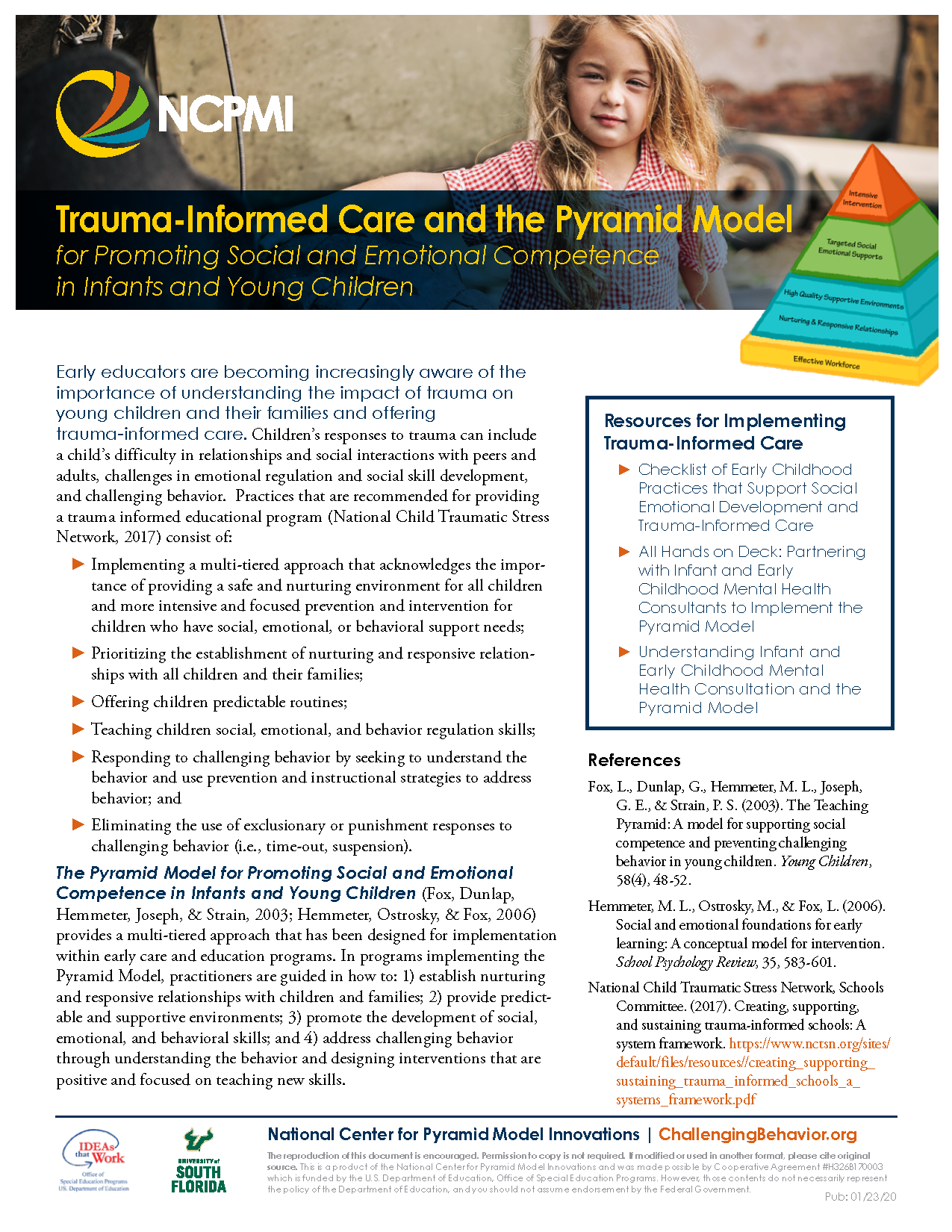
This factsheet outlines the recommended practices, developed by the National Child Traumatic Stress Network, for providing a trauma-informed educational program and how the Pyramid Model supports these.
Programs and Data-Based Decision-Making
To access all data-based decision-making tools, accompanying resources, and tutorials, please visit the Data-Based Decision-Making page.

The Behavior Incident Report System (BIRS) provides early care and education programs and classrooms with a system to collect and analyze behavior incidents in their program. The system provides an efficient mechanism for gathering information on elements related to behavior incidents that can be used analytically to make decisions about providing supports to teachers and children within the program. Teachers within programs collect data on behavior incidents that are not developmentally normative or are a cause of concern to the teacher. These data are summarized monthly to provide formative data for examining factors related to behavior incidents (child, teacher, activity, behavior type, behavior motivation, and responses to the behavior). In addition, these data provide summative information on the frequency of behavior incidents over time and an analysis of potential equity issue by calculating disproportionality related to race, ethnicity, IEP status, gender, and dual language learners.
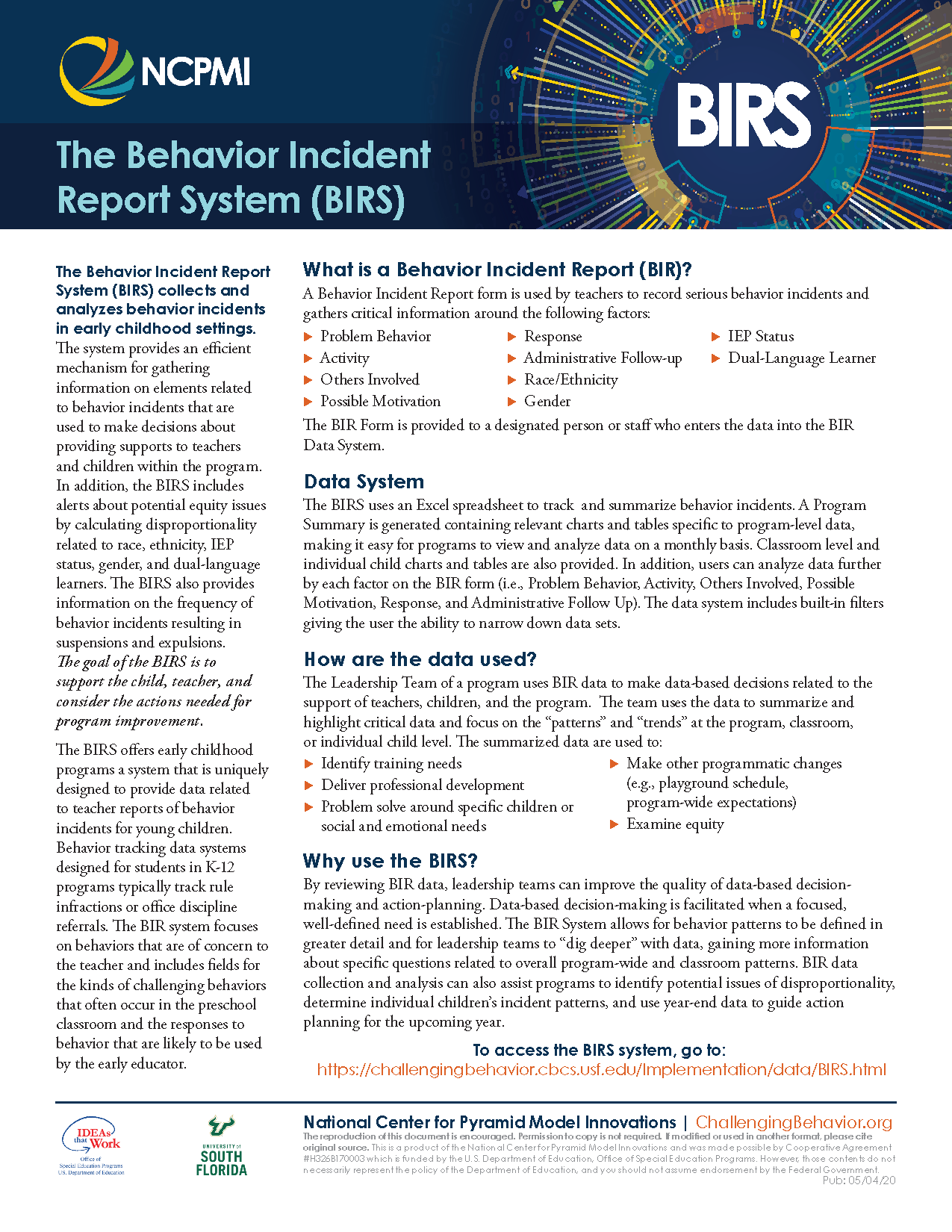
This fact sheet describes the BIR system, features, and value for an early childhood program.
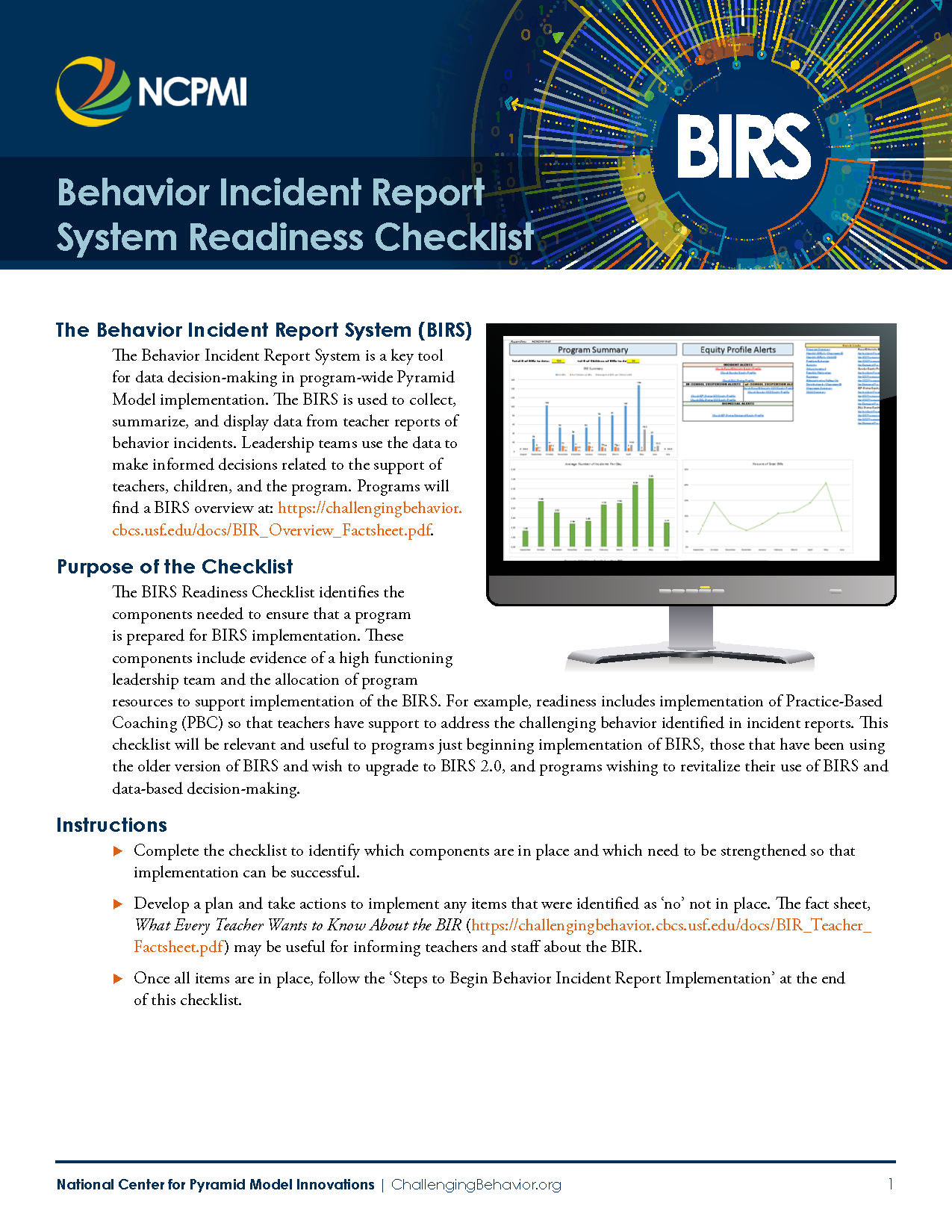
The BIRS Readiness Checklist identifies the components needed to ensure that a program is prepared for BIRS implementation.
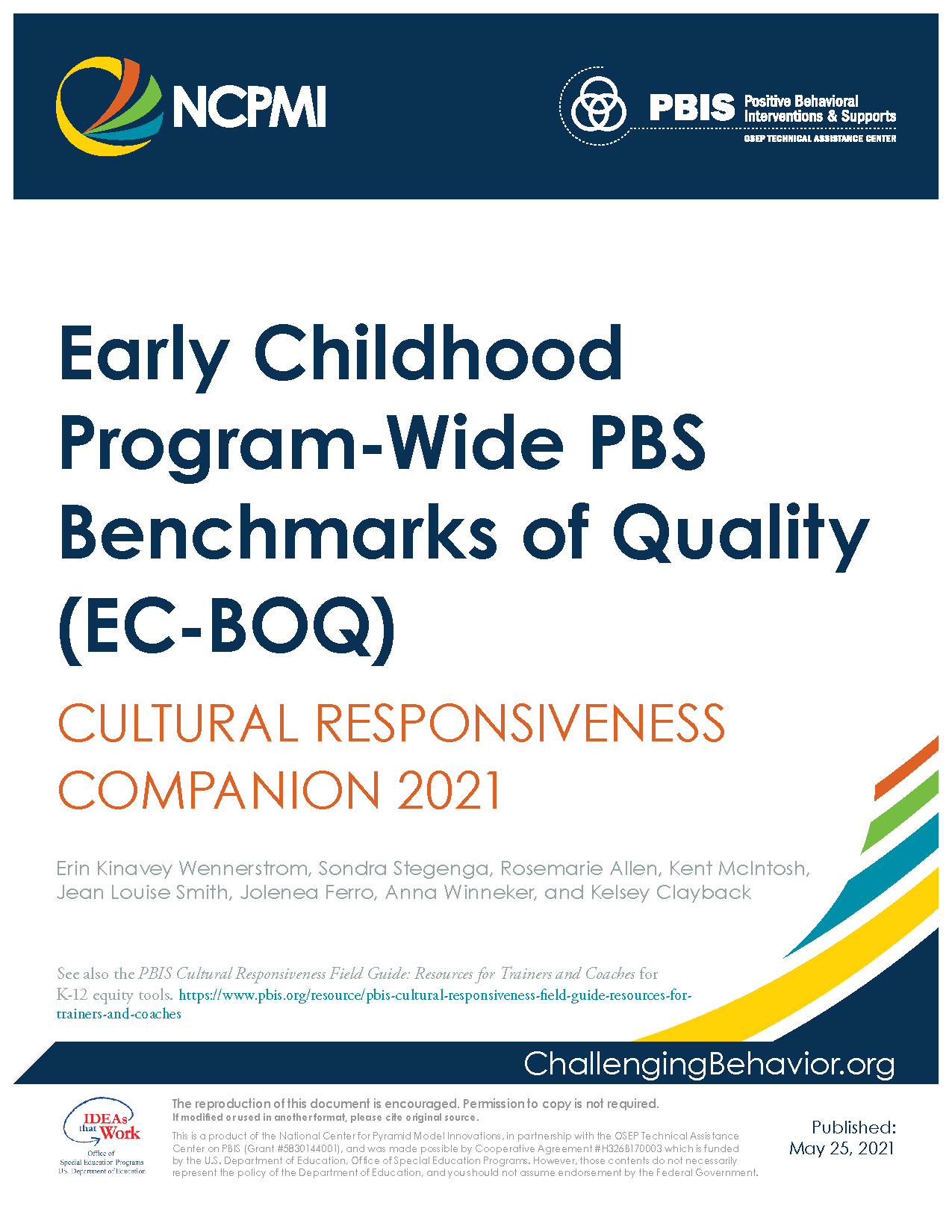
This is a companion to the Early Childhood Program-Wide PBS Benchmarks of Quality. It is a resource for early childhood PBS implementation teams to enhance the fit of their Pyramid Model systems with the cultural needs of children and families.
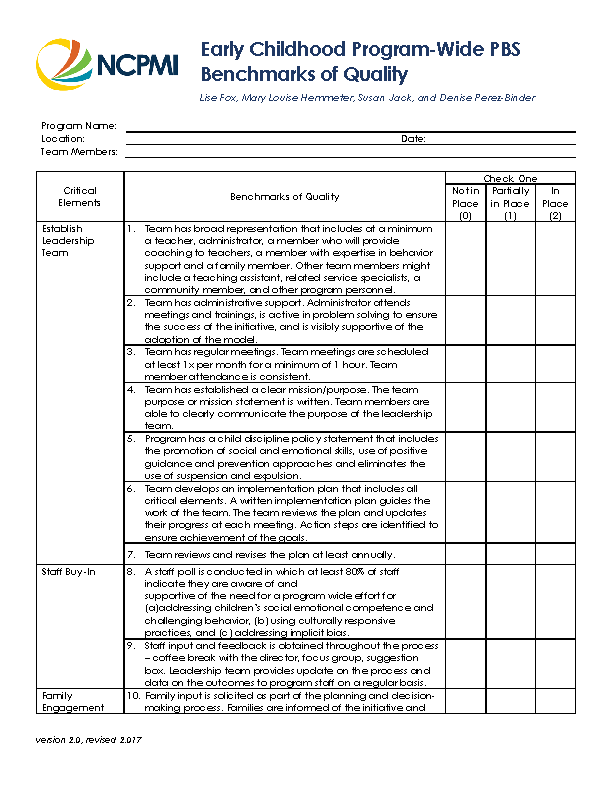
Authors: Lise Fox, Mary Louise Hemmeter, Susan Jack, and Denise Perez Binder (2017).
The Early Childhood Program-Wide PBS Benchmarks of Quality (Program BoQ) is designed to help programs evaluate their progress toward implementing the Pyramid Model program-wide. The tool was revised in 2017 to include critical elements to address issues related to equity and culturally responsive practices. The tool and spreadsheet used for analysis are provided.
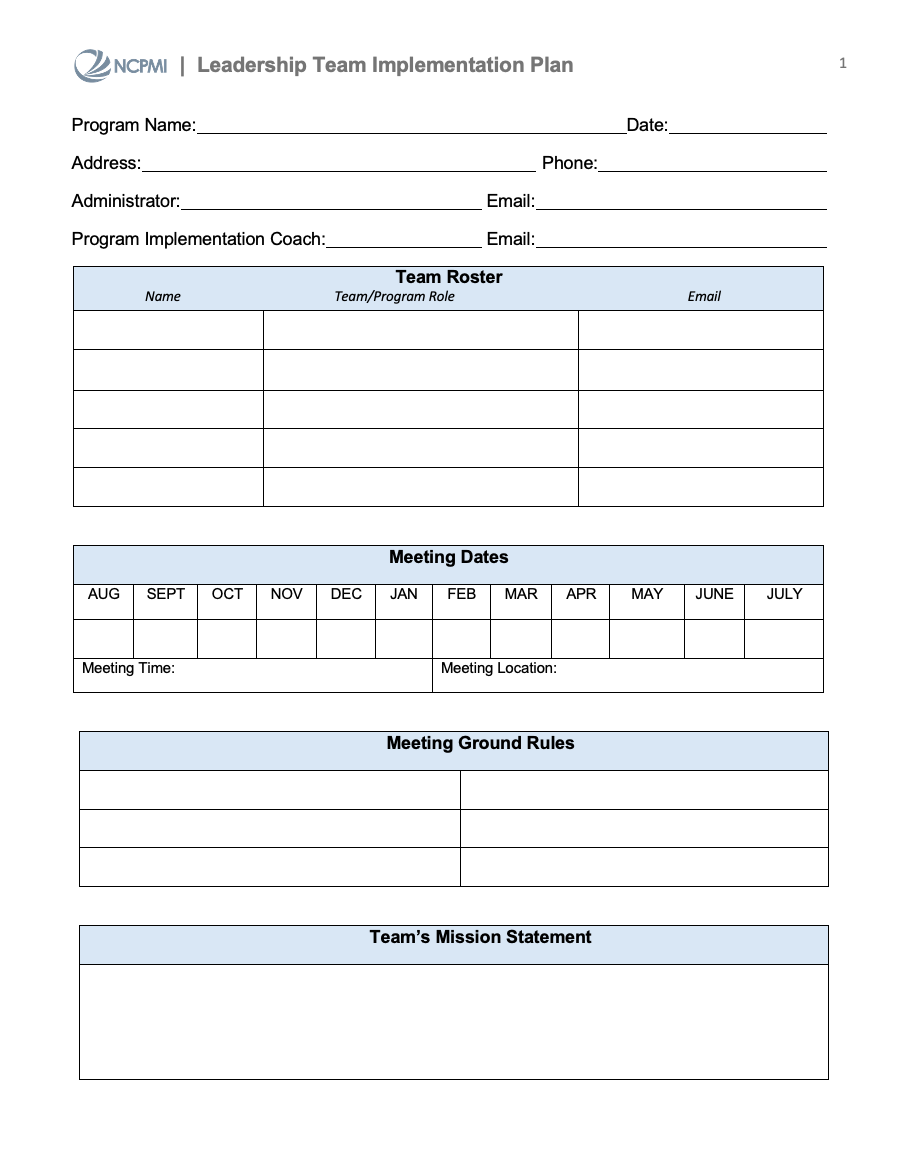
This form is used by Classroom Program Leadership Teams to write down their implementation action plans related to each benchmark of quality.

This form is used by Classroom Program Leadership Teams to write down their implementation action plans related to each benchmark of quality.
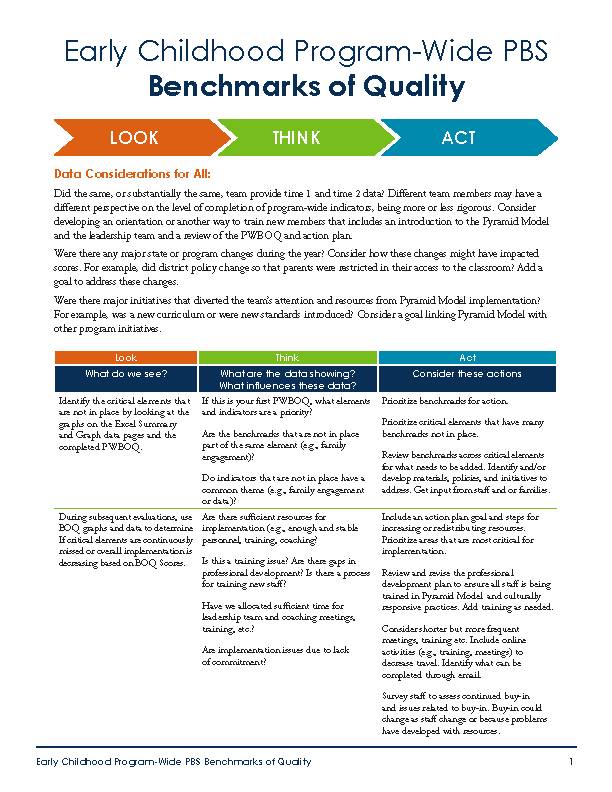
The Leadership Team can use this document to guide the three steps of data review and decision-making (Look-Think-Act). The guide provides the information on the data to review, the questions to consider, and potential actions. This guide t is used with the data summaries of the Program-Wide PBS Benchmarks of Quality.

This resource answers frequently asked questions regarding the use of the Behavior Incident Reporting System.
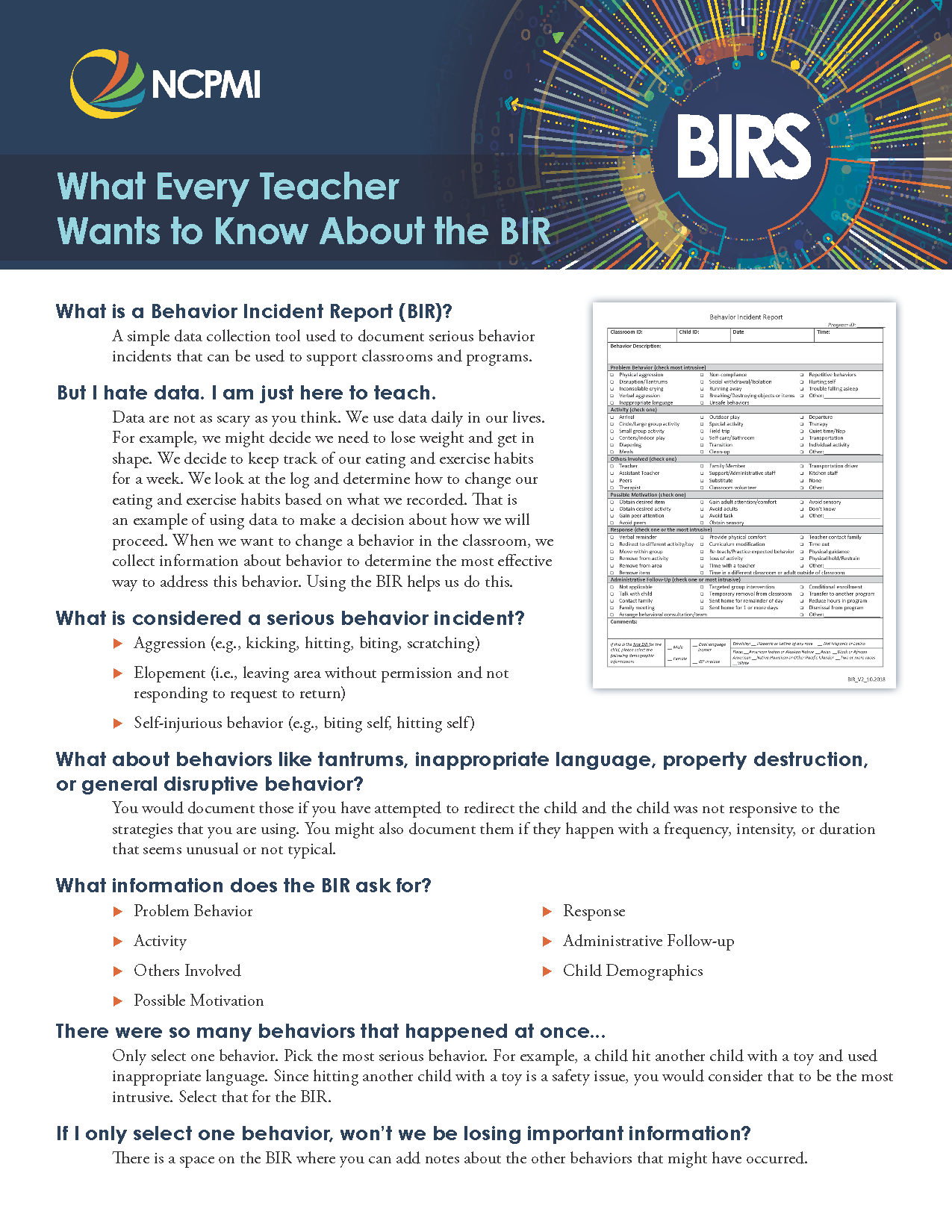
This handout provides teachers with information about the BIR and how they will collect data in the classroom.
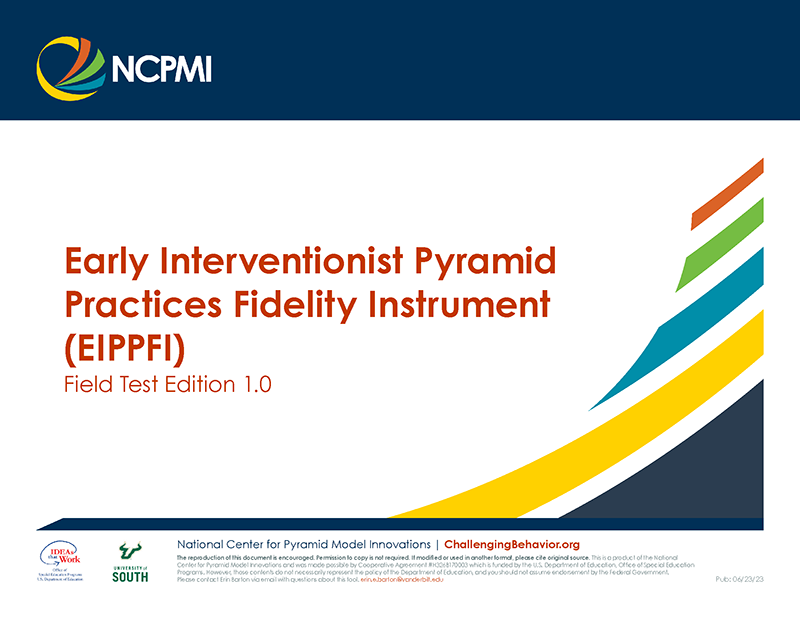
The Early Intervention Pyramid Practice Fidelity Instrument (EIPPFI) is used to assess the implementation of Pyramid Model practices by early interventionists in the coaching of family caregivers. EIPPFI practices are aligned with the Division for Early Childhood Recommended Practices and the Principles of Early Intervention. EIPPFI organizes practices within six practice categories: 1) Building Partnerships with Families; 2) Social Emotional Development; 3) Family-centered Coaching; 4) Dyadic Relationships; 5) Children with Challenging Behavior; and 6) Social Emotional Assessment.

This form is used by Early Intervention Program Leadership Teams to write down their implementation action plans related to each benchmark of quality.

This form is used by Early Intervention Program Leadership Teams to write down their implementation action plans related to each benchmark of quality.
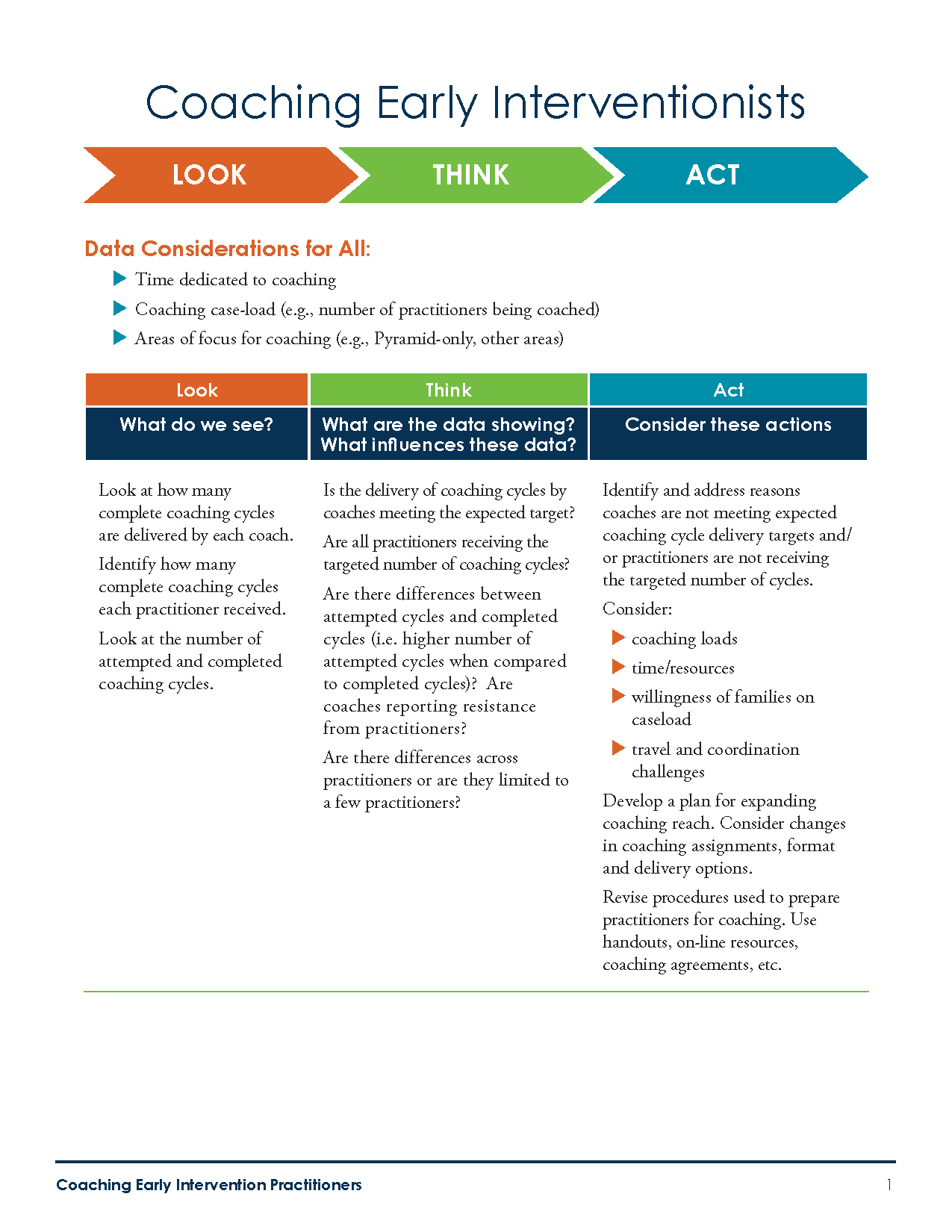
The Leadership Team can use this document to guide the three steps of data review and decision-making (Look-Think-Act). The guide provides the information on the data to review, the questions to consider, and potential actions. This guide is used to examine data from the Early Intervention Practitioner Coaching Log and the EIPPFI.
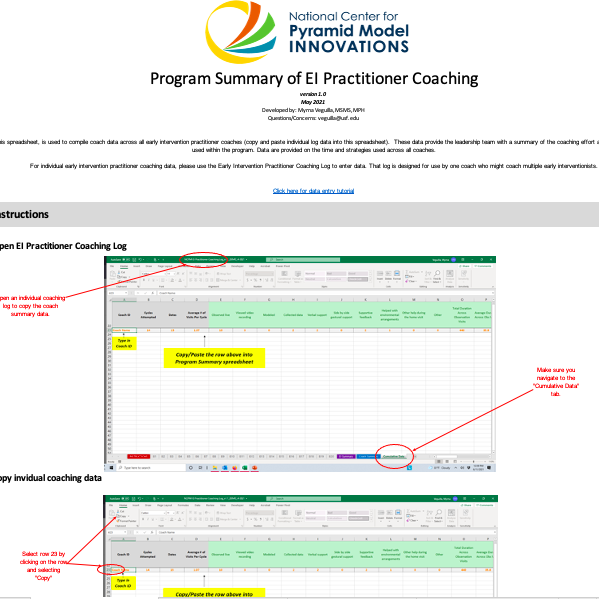
This spreadsheet is to be used to combine data from EI Practitioner Coaches in the same program. It provides a summary across EI Practitioner Coaches.
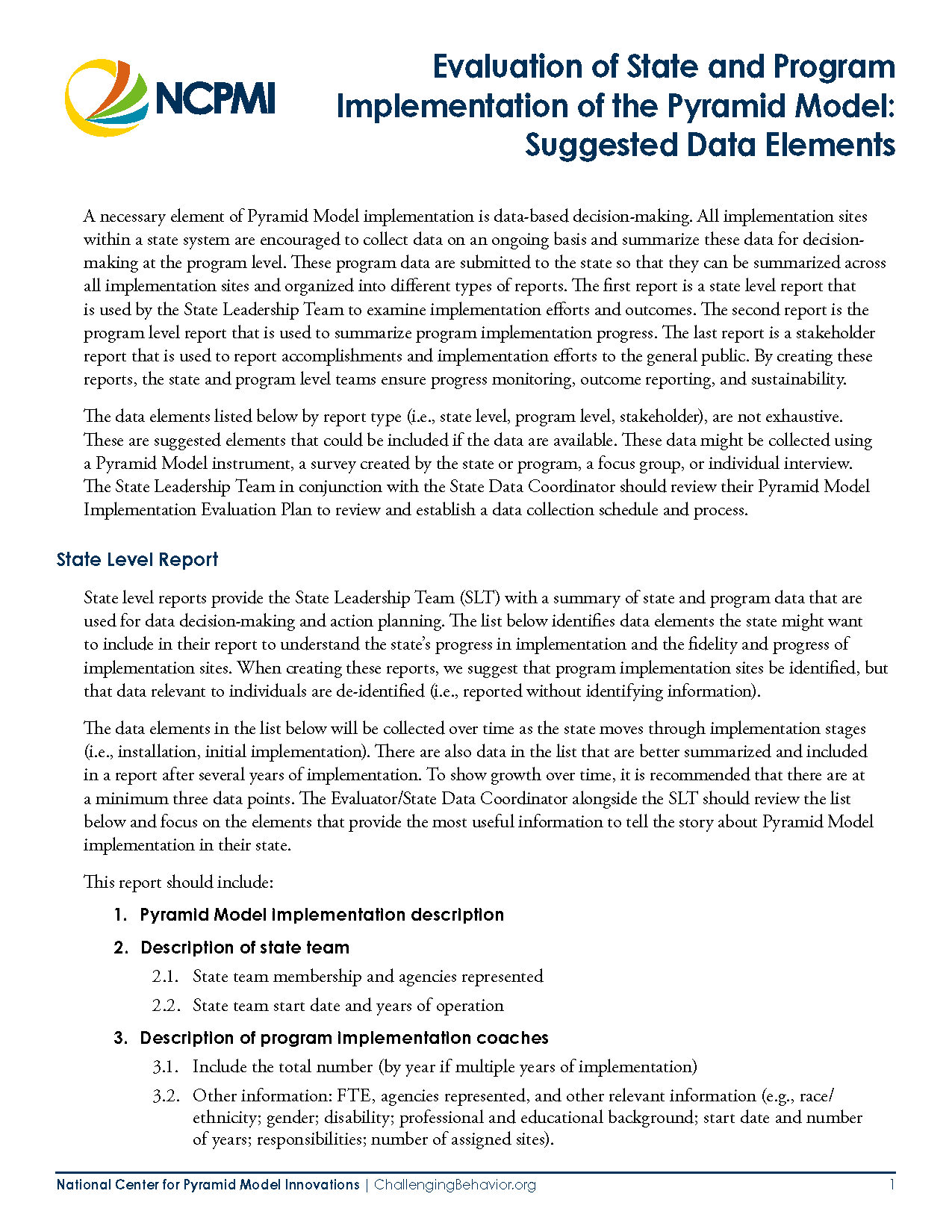
This resource describes the data elements that might be included in the different evaluation reports in a state system implementing the Pyramid Model.
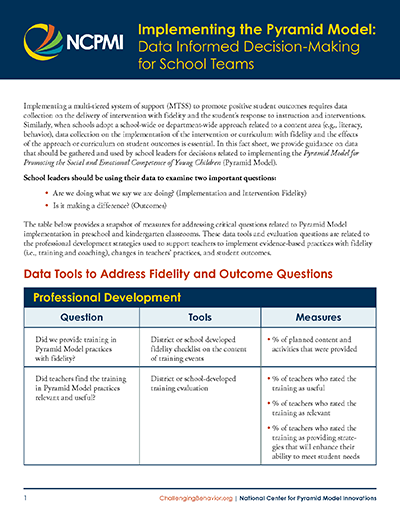
A tip sheet providing guidance on data that should be gathered and used by school leaders for decisions related to implementing the Pyramid Model.
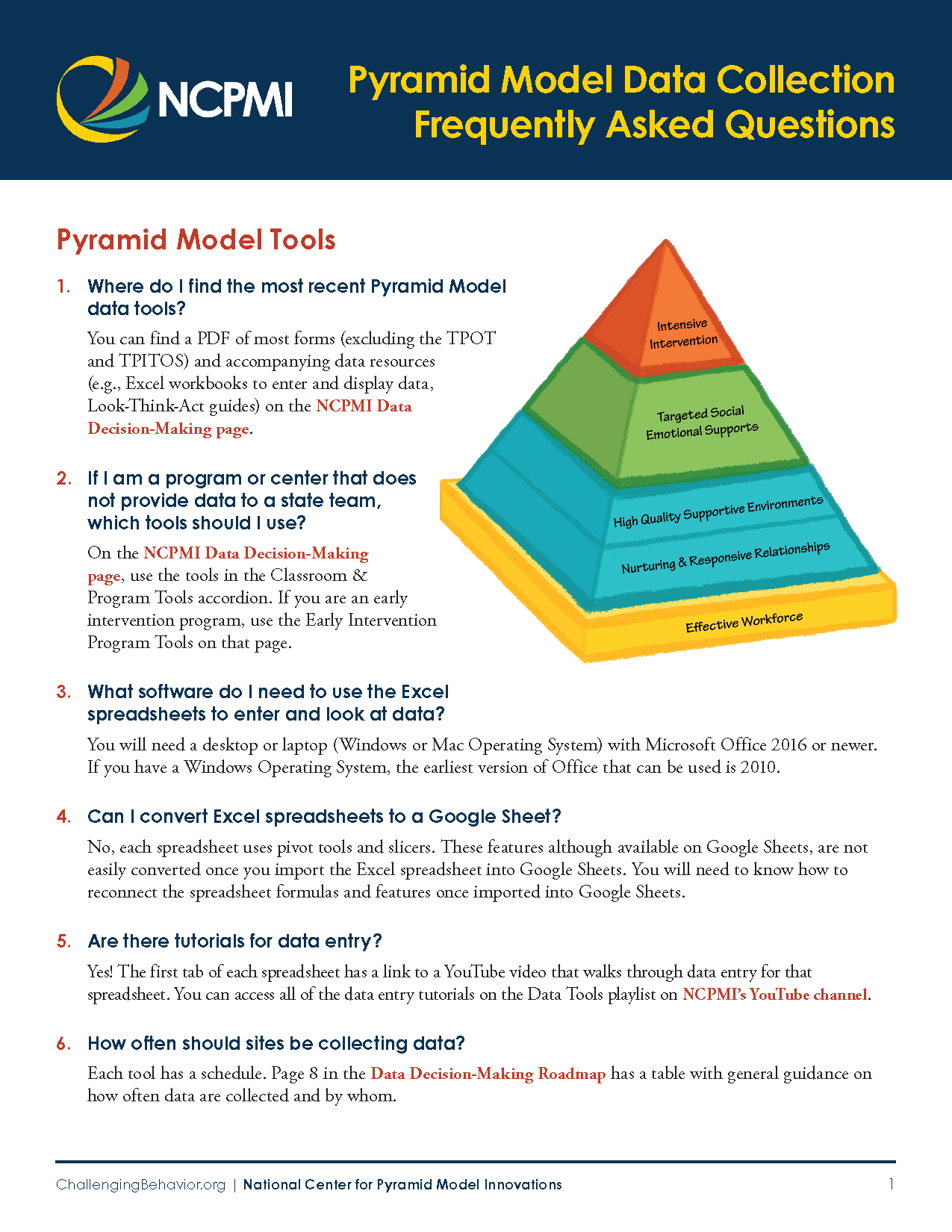
This resource answers some of the most frequently asked questions about the collection and summary of Pyramid Model data.

This tip sheet provides guidance for program leadership teams on establishing unique identification codes (IDs) instead of using names and other identifying information for data collected about children, early interventionists, and teachers.

This resource describes the program level data coordination responsibilities at programs implementing the Pyramid Model.

This Roadmap provides programs with guidance on how to collect and use data to ensure the implementation of the Pyramid Model with fidelity and decision-making that improves positive child outcomes.
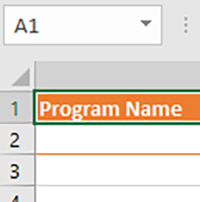
This Excel template is for users to organize their unique IDs for programs, practitioner coaches, practitioners, and children.



